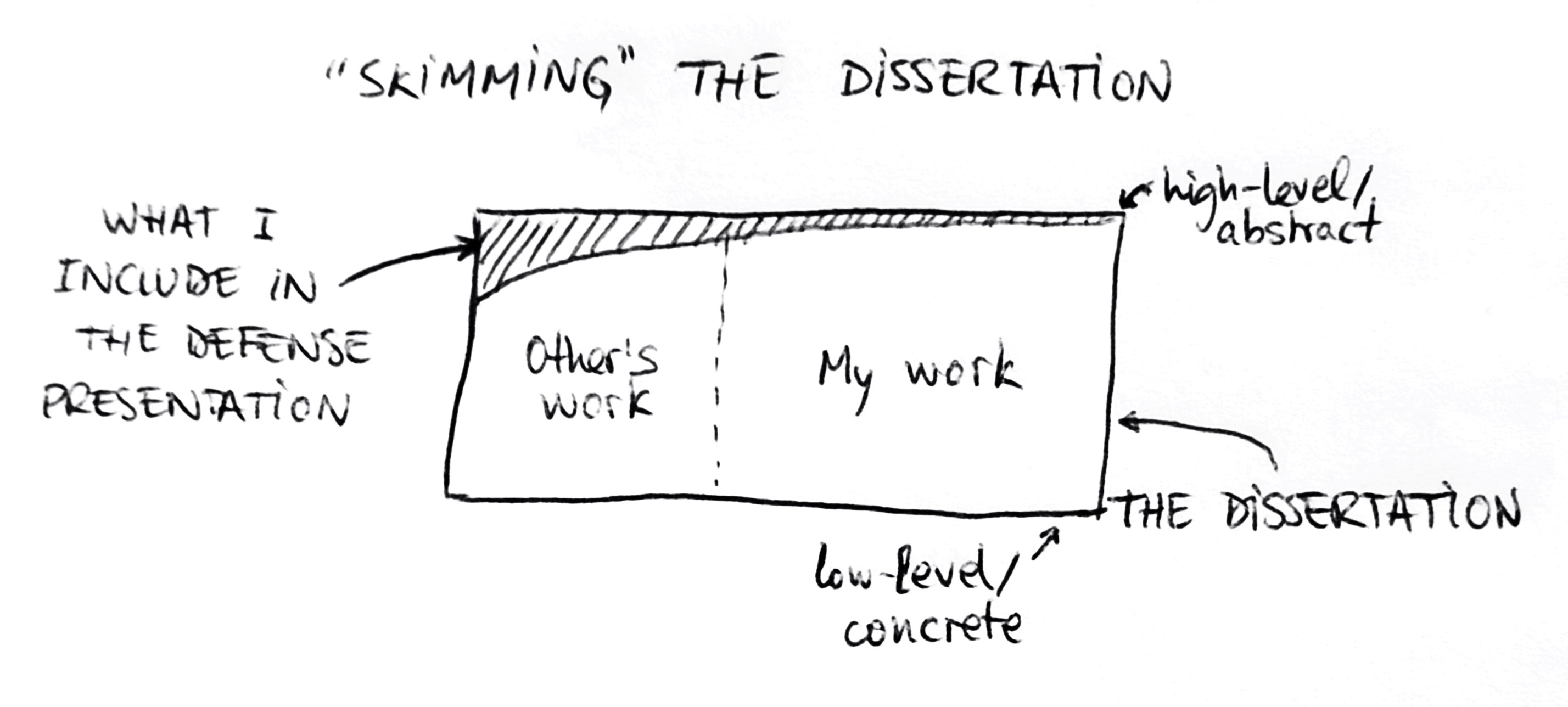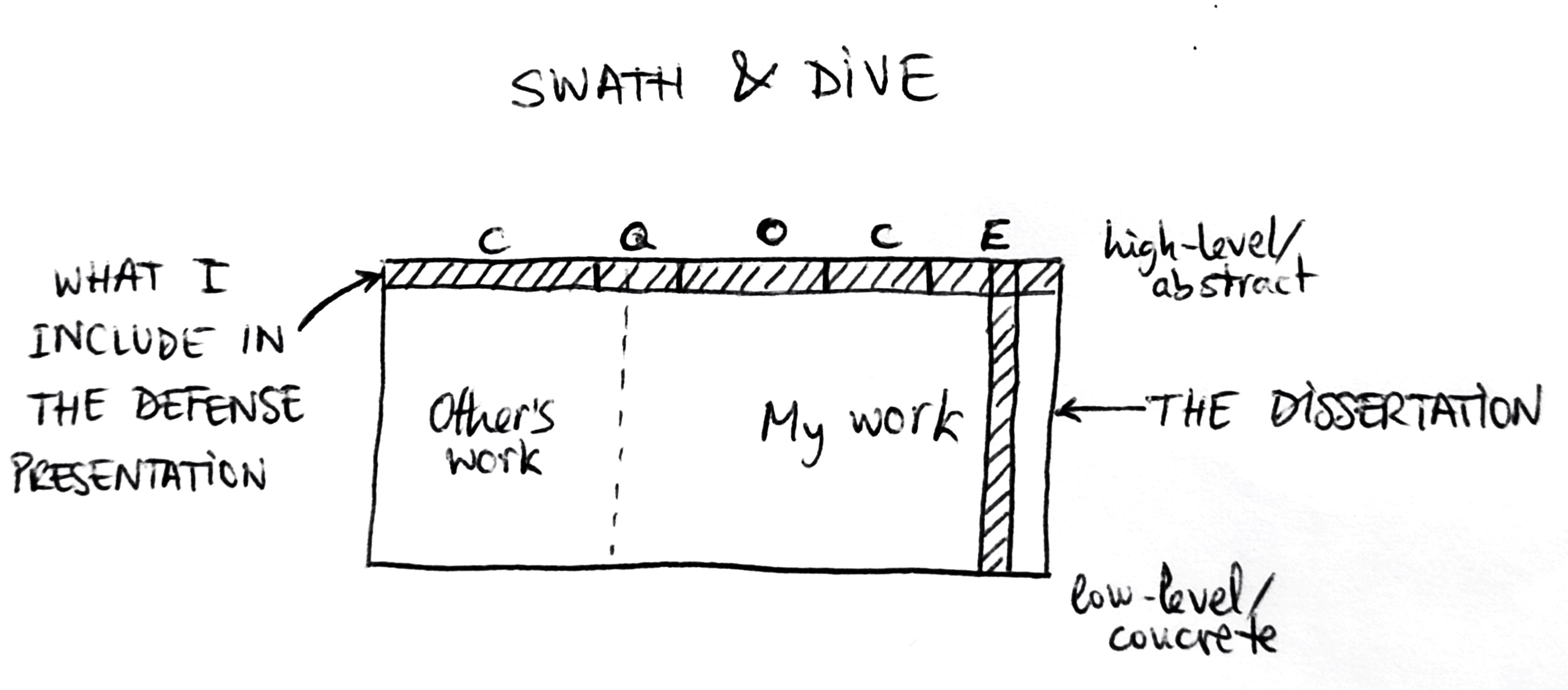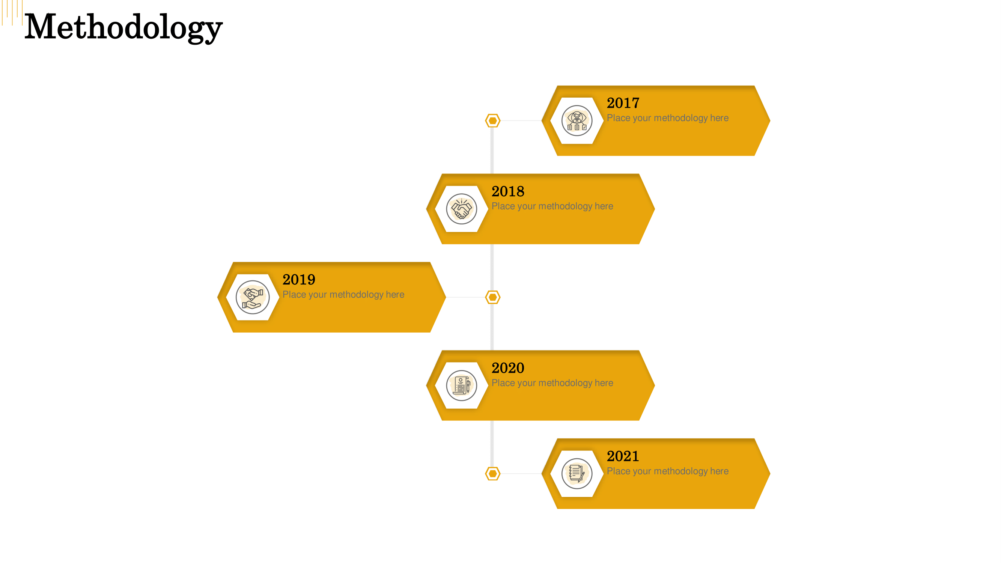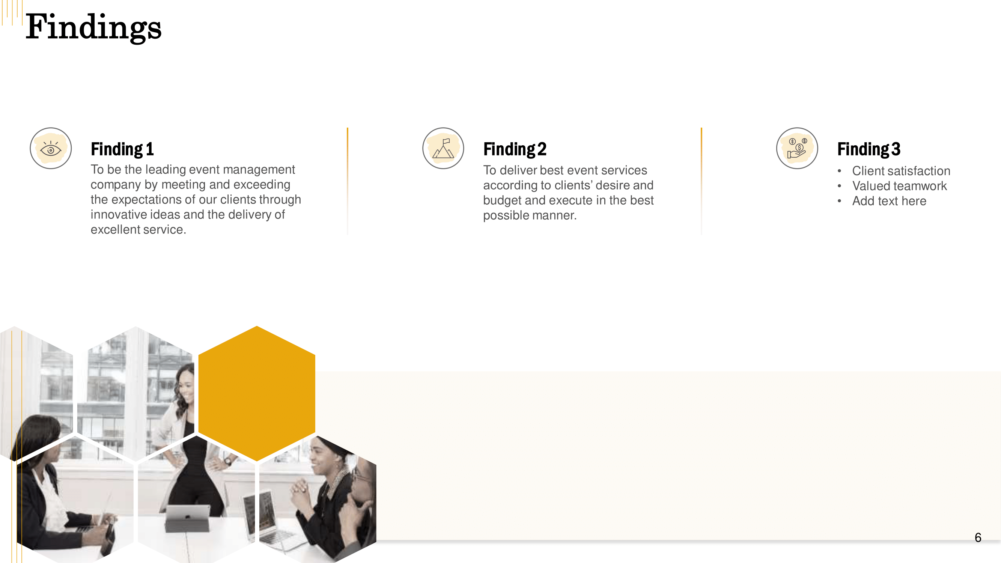The Ultimate Guide to Preparing Your PhD Dissertation Defense Presentation
January 12, 2023

Chances are, you’ve been waiting years for this moment: preparing your PhD dissertation defense.
You’ve made it this far in your doctorate journey, so you’ll really want to nail the final thing standing between you and your PhD.
We’ll break down everything you need to know, from what the dissertation defense is to how to prepare and more importantly, succeed.
Here’s our ultimate guide for preparing for your PhD dissertation defense.

What Is a PhD Dissertation Defense Presentation?
A PhD dissertation defense is your chance to defend your work in front of the academics analyzing your research. You might also hear this called a “thesis defense.”
Although the thought of having experts critique you in a cross-examination setting, a dissertation defense is just an opportunity for you to show off your best work .
What Is a PhD Dissertation Committee?
A PhD dissertation committee is a group you assemble to guide you through the dissertation process, from preparation to the revision of your dissertation.
You choose the members of the committee after all the academic work is finalized. Usually, members will be trusted faculty — people you know well who you might consider a mentor.
How to Prepare for Your PhD Dissertation Defense Presentation
Preparing for your PhD dissertation defense doesn’t have to be stressful.
Try using Yoodli , an AI-powered speech coach that analyzes your speaking patterns and identifies areas in which you can improve. By practicing your dissertation defense presentation through Yoodli, you’ll be able to not only improve your speaking, but boost your confidence as well.
For example, you can take an in-depth look at the filler words you use, including which ones come up the most often and precisely how often they come up.

Here are three more tips for preparing your PhD dissertation defense.
1. Don’t wait around.
One of the best things you can do for yourself when preparing your PhD dissertation defense is to start the work early. You won’t regret starting “too early” like you would regret starting the preparation too late in the game.
Designing your presentation slides will take time and isn’t something you can slap together in a pinch. Right after your thesis is finalized, start on the slides. Your aim is to impress the committee with a thought-out, clear presentation that presents your work in a good light.
2. Practice, practice, practice.
It doesn’t matter how confident or comfortable you are with regard to your work and the actual PhD dissertation defense — you need to practice like your life depends on it.
Be sure to practice not only the presentation, but also your body language, like hand gestures . You don’t want to seem too stiff or anxious during your dissertation defense, and practicing all these elements at once gives you an idea of what you need to work on.
You’ll also want to work on your tone, to make sure you don’t come off as sounding monotonic . You want the committee members to feel interested and engaged.
Taking one of Yoodli’s free public speaking courses — such as the fundamentals of public speaking — can also build on your confidence and make you feel more comfortable during the dissertation defense.
Check out Yoodli’s 10-minute course here:
3. Check out other candidates’ presentations.
Sometimes, universities will offer open PhD dissertation defense presentations. If your university is one of them, it’s a great idea to attend a few . If your university doesn’t offer open dissertation presentations, check out other local universities that might offer these.
Watching other candidates’ presentations can help you not only get a firsthand look at how a presentation should (or shouldn’t!) go, but also to affirm that dissertation defense presentations aren’t as awful and scary as you might think they are. You might even get some insight or a few ideas for your own presentation while you’re at it.
The Bottom Line
Preparing for your PhD dissertation defense presentation doesn’t have to be overwhelming. After all, it’s all part of your doctorate journey . With preparation and practice, you can use this opportunity to shine and show off your best work.
Start practicing with Yoodli.
Getting better at speaking is getting easier. Record or upload a speech and let our AI Speech Coach analyze your speaking and give you feedback.

Defending Your Dissertation: A Guide

Written by Luke Wink-Moran | Photo by insta_photos
Dissertation defenses are daunting, and no wonder; it’s not a “dissertation discussion,” or a “dissertation dialogue.” The name alone implies that the dissertation you’ve spent the last x number of years working on is subject to attack. And if you don’t feel trepidation for semantic reasons, you might be nervous because you don’t know what to expect. Our imaginations are great at making The Unknown scarier than reality. The good news is that you’ll find in this newsletter article experts who can shed light on what dissertations defenses are really like, and what you can do to prepare for them.
The first thing you should know is that your defense has already begun. It started the minute you began working on your dissertation— maybe even in some of the classes you took beforehand that helped you formulate your ideas. This, according to Dr. Celeste Atkins, is why it’s so important to identify a good mentor early in graduate school.
“To me,” noted Dr. Atkins, who wrote her dissertation on how sociology faculty from traditionally marginalized backgrounds teach about privilege and inequality, “the most important part of the doctoral journey was finding an advisor who understood and supported what I wanted from my education and who was willing to challenge me and push me, while not delaying me. I would encourage future PhDs to really take the time to get to know the faculty before choosing an advisor and to make sure that the members of their committee work well together.”
Your advisor will be the one who helps you refine arguments and strengthen your work so that by the time it reaches your dissertation committee, it’s ready. Next comes the writing process, which many students have said was the hardest part of their PhD. I’ve included this section on the writing process because this is where you’ll create all the material you’ll present during your defense, so it’s important to navigate it successfully. The writing process is intellectually grueling, it eats time and energy, and it’s where many students find themselves paddling frantically to avoid languishing in the “All-But-Dissertation” doldrums. The writing process is also likely to encroach on other parts of your life. For instance, Dr. Cynthia Trejo wrote her dissertation on college preparation for Latin American students while caring for a twelve-year-old, two adult children, and her aging parents—in the middle of a pandemic. When I asked Dr. Trejo how she did this, she replied:
“I don’t take the privilege of education for granted. My son knew I got up at 4:00 a.m. every morning, even on weekends, even on holidays; and it’s a blessing that he’s seen that work ethic and that dedication and the end result.”
Importantly, Dr. Trejo also exercised regularly and joined several online writing groups at UArizona. She mobilized her support network— her partner, parents, and even friends from high school to help care for her son.
The challenges you face during the writing process can vary by discipline. Jessika Iwanski is an MD/PhD student who in 2022 defended her dissertation on genetic mutations in sarcomeric proteins that lead to severe, neonatal dilated cardiomyopathy. She described her writing experience as “an intricate process of balancing many things at once with a deadline (defense day) that seems to be creeping up faster and faster— finishing up experiments, drafting the dissertation, preparing your presentation, filling out all the necessary documents for your defense and also, for MD/PhD students, beginning to reintegrate into the clinical world (reviewing your clinical knowledge and skill sets)!”
But no matter what your unique challenges are, writing a dissertation can take a toll on your mental health. Almost every student I spoke with said they saw a therapist and found their sessions enormously helpful. They also looked to the people in their lives for support. Dr. Betsy Labiner, who wrote her dissertation on Interiority, Truth, and Violence in Early Modern Drama, recommended, “Keep your loved ones close! This is so hard – the dissertation lends itself to isolation, especially in the final stages. Plus, a huge number of your family and friends simply won’t understand what you’re going through. But they love you and want to help and are great for getting you out of your head and into a space where you can enjoy life even when you feel like your dissertation is a flaming heap of trash.”
While you might sometimes feel like your dissertation is a flaming heap of trash, remember: a) no it’s not, you brilliant scholar, and b) the best dissertations aren’t necessarily perfect dissertations. According to Dr. Trejo, “The best dissertation is a done dissertation.” So don’t get hung up on perfecting every detail of your work. Think of your dissertation as a long-form assignment that you need to finish in order to move onto the next stage of your career. Many students continue revising after graduation and submit their work for publication or other professional objectives.
When you do finish writing your dissertation, it’s time to schedule your defense and invite friends and family to the part of the exam that’s open to the public. When that moment comes, how do you prepare to present your work and field questions about it?
“I reread my dissertation in full in one sitting,” said Dr. Labiner. “During all my time writing it, I’d never read more than one complete chapter at a time! It was a huge confidence boost to read my work in full and realize that I had produced a compelling, engaging, original argument.”
There are many other ways to prepare: create presentation slides and practice presenting them to friends or alone; think of questions you might be asked and answer them; think about what you want to wear or where you might want to sit (if you’re presenting on Zoom) that might give you a confidence boost. Iwanksi practiced presenting with her mentor and reviewed current papers to anticipate what questions her committee might ask. If you want to really get in the zone, you can emulate Dr. Labiner and do a full dress rehearsal on Zoom the day before your defense.
But no matter what you do, you’ll still be nervous:
“I had a sense of the logistics, the timing, and so on, but I didn’t really have clear expectations outside of the structure. It was a sort of nebulous three hours in which I expected to be nauseatingly terrified,” recalled Dr. Labiner.
“I expected it to be terrifying, with lots of difficult questions and constructive criticism/comments given,” agreed Iwanski.
“I expected it to be very scary,” said Dr. Trejo.
“I expected it to be like I was on trial, and I’d have to defend myself and prove I deserved a PhD,” said Dr Atkins.
And, eventually, inexorably, it will be time to present.
“It was actually very enjoyable” said Iwanski. “It was more of a celebration of years of work put into this project—not only by me but by my mentor, colleagues, lab members and collaborators! I felt very supported by all my committee members and, rather than it being a rapid fire of questions, it was more of a scientific discussion amongst colleagues who are passionate about heart disease and muscle biology.”
“I was anxious right when I logged on to the Zoom call for it,” said Dr. Labiner, “but I was blown away by the number of family and friends that showed up to support me. I had invited a lot of people who I didn’t at all think would come, but every single person I invited was there! Having about 40 guests – many of them joining from different states and several from different countries! – made me feel so loved and celebrated that my nerves were steadied very quickly. It also helped me go into ‘teaching mode’ about my work, so it felt like getting to lead a seminar on my most favorite literature.”
“In reality, my dissertation defense was similar to presenting at an academic conference,” said Dr. Atkins. “I went over my research in a practiced and organized way, and I fielded questions from the audience.
“It was a celebration and an important benchmark for me,” said Dr. Trejo. “It was a pretty happy day. Like the punctuation at the end of your sentence: this sentence is done; this journey is done. You can start the next sentence.”
If you want to learn more about dissertations in your own discipline, don’t hesitate to reach out to graduates from your program and ask them about their experiences. If you’d like to avail yourself of some of the resources that helped students in this article while they wrote and defended their dissertations, check out these links:
The Graduate Writing Lab
https://thinktank.arizona.edu/writing-center/graduate-writing-lab
The Writing Skills Improvement Program
https://wsip.arizona.edu
Campus Health Counseling and Psych Services
https://caps.arizona.edu
https://www.scribbr.com/
Like what you're reading?
How to create a great thesis defense presentation: everything you need to know
Get your team on prezi – watch this on demand video.
Anete Ezera April 13, 2024
Ready to take on your thesis defense presentation? It’s not just about wrapping up years of study; it’s your moment to share your insights and the impact of your work. A standout presentation can make all the difference. It’s your chance to highlight the essentials and really connect with your audience.
This is where Prezi comes into play. Forget about flipping through slide after slide. With Prezi, you craft a narrative that pulls your audience in. It simplifies the complex, ensuring your key points hit home. Let’s explore how Prezi can help transform your thesis defense into a successful presentation.

What is a thesis defense presentation and why are they needed?
Whether you’re preparing for a master’s thesis defense or a Ph.D. thesis defense, this final step in your academic journey is the one with the most significance, as it dramatically influences your final grade. It’s also your chance to display the dedication and effort you’ve put into your research, a way to demonstrate how significant your work is.
So, why is this such a big deal? A good presentation helps convince your teachers that your research is solid and makes a difference in your field. It’s your time to answer questions, show that your research methods were sound, and point out what’s new and interesting about your work. In the end, a great thesis defense presentation helps you finish strong and makes sure you leave a lasting impression as you wrap up this chapter of your academic life.
Best practices for making a successful thesis defense presentation
In order to craft a standout thesis defense presentation, you need to do more than just deliver research findings. Here are some key strategies to ensure success, and how Prezi can play a crucial role in elevating your presentation.
Start with a strong introduction
Kick-off with an engaging introduction that lays out your research question, its significance, and your objectives. This initial segment grabs attention and sets the tone. Using Prezi’s zoom feature can make your introduction pop by visually underscoring key points, helping your audience grasp the importance of your work right from the start.
Organize your presentation clearly
A coherent structure is essential for guiding your audience through your thesis defense presentation. Prezi can help by offering a map view of your content’s layout upfront, providing a clear path through your introduction, methodology, results, and conclusion. This clarity keeps your audience engaged and makes your arguments easier to follow.
Incorporate multimedia elements
Adding multimedia elements like videos, audio clips, and animations can greatly improve the appeal of your thesis defense presentation. Prezi supports the seamless integration of these elements, allowing you to bring your research to life in a more vibrant and engaging way. Videos can serve as powerful testimonials or demonstrations, while animations can help illustrate complex processes or changes over time. This variety keeps your audience engaged and helps convey your message in a more exciting way.

Simplify complex data
Your findings need to be presented in a way that’s easy for your audience to understand. Prezi shines here, with tools that transform intricate data into clear, engaging visuals. By implementing charts and graphs into your presentation, you can make your data stand out and support your narrative effectively.
Engage your audience
Make your thesis defense a two-way conversation by interacting with your audience. Whether it’s through questions, feedback, or direct participation, engagement is key. Prezi allows for a flexible presentation style, letting you navigate sections in response to audience input, creating a dynamic and engaging experience.
Highlight key takeaways
Emphasize the key takeaways of your research throughout your presentation to ensure your audience grasps the most critical aspects of your work. With Prezi, you can use spotlighting and strategic zooming to draw attention to these takeaways, making them stand out. This method helps reinforce your main points, ensuring they stick with your audience long after your presentation concludes. By clearly defining what your audience should remember, you guide their understanding and appreciation of your research’s value and implications.
Practice makes perfect
Confidence in delivery comes from thorough practice. Familiarize yourself with every aspect of your thesis defense presentation, including timing, voice control, and gestures. Prezi Video is a great tool for rehearsing, as it allows you to blend your presentation materials with your on-camera performance, mirroring the live defense setting and helping you polish your delivery.

End with a lasting impression
Conclude your presentation powerfully by summarizing your main findings, their implications, and future research directions. Prezi’s ability to zoom out and show the big picture at your conclusion helps reinforce how each section of your presentation contributes to your overall thesis, ensuring your research leaves a memorable impact on your audience.
By using these tips and taking advantage of what Prezi offers, you can make your thesis defense presentation really stand out. It’ll not only hit the mark with your audience but also clearly show why your research matters.
Meeting tight deadlines with Prezi
Facing a looming deadline for your thesis defense presentation? Prezi offers smart solutions to help you create a polished and engaging presentation quickly, even if it feels like you’re down to the wire.
A closer look at Prezi AI features
Prezi AI is a standout feature for those pressed for time. It assists in structuring your presentation efficiently, suggesting design elements and layouts that elevate your content. This AI-driven approach means you can develop a presentation that looks meticulously planned and executed in a fraction of the time it would normally take. The result? A presentation that communicates the depth and value of your research clearly and effectively, without the last-minute rush being evident. Here’s what Prezi AI can do:
- Streamlined creation process: At the core of Prezi’s efficiency is the AI presentation creator . Perfect for those last-minute crunch times, it’s designed to tackle tight deadlines with ease.
- Easy start: Kick off your presentation creation with just a click on the “Create with AI” button. Prezi AI guides you through a smooth process, transforming your initial ideas or keywords into a structured and visually appealing narrative.
- Visual impact: There’s no need to dive deep into design details. Simply provide some basic input, and Prezi AI will craft it into a presentation that grabs and holds your audience’s attention, making your thesis defense visually compelling.
- AI text editing: Spending too much time fine-tuning your message? Prezi AI text editing features can help. Whether you need to expand on a concept, clarify complex terms, or condense your content without losing impact, Prezi AI streamlines these tasks.
- Content refinement: Adjust text length for deeper explanation, simplify language for better understanding, and ensure your presentation’s content is precise and to the point. Prezi AI editing tools help you refine your message quickly, so you can focus on the essence of your research.
Using Prezi Video for remote thesis defense presentations
For remote thesis defenses, Prezi Video steps up to ensure your presentation stands out. It integrates your on-screen presence alongside your presentation content, creating a more personal and engaging experience for your audience. This is crucial in maintaining attention and interest, particularly in a virtual format where keeping your audience engaged presents additional challenges. Prezi Video makes it seem as though you’re presenting live alongside your slides, helping to simulate the in-person defense experience and keep your audience focused on what you’re saying.

Using these advanced Prezi features, you can overcome tight deadlines with confidence, ensuring your thesis defense presentation is both impactful and memorable, no matter the time constraints.
The Prezi experience: what users have to say
Prezi users have shared compelling insights on how the platform’s unique features have revolutionized their presentations. Here’s how their experiences can inspire your thesis defense presentation:
Storytelling with Prezi
Javier Schwersensky highlights the narrative power of Prezi: “This is a tool that is going to put you ahead of other people and make you look professional and make your ideas stand out,” he remarks. For your thesis defense, this means Prezi can help you craft a narrative that not only presents your research but tells a story that captures and retains the committee’s interest.
Flexibility and creativity
Tamara Montag-Smit appreciates Prezi for its “functionality of the presentation that allows you to present in a nonlinear manner.” This flexibility is key in a thesis defense, allowing you to adapt your presentation flow in real time based on your audience’s engagement or questions, ensuring a more dynamic and interactive defense.
The open canvas
Vitek Dočekal values Prezi’s open canvas , which offers “creative freedom” and the ability to “create a mind map and determine how to best present my ideas.” For your thesis defense, this means Prezi lets you lay out and show off your work in a way that makes sense and grabs your audience’s attention, turning complicated details into something easy and interesting to follow.
Engagement and retention
Adam Rose points out the engagement benefits of Prezi: “Being able to integrate videos is extremely effective in capturing their attention.” When you need to defend a thesis, using Prezi to include videos or interactive content can help keep your committee engaged, making your presentation much more memorable.
These real insights show just how effective Prezi is for crafting truly influential presentations. By incorporating Prezi into your thesis defense presentation, you can create a defense that not only shows how strong your research is but also leaves a lasting impression on your audience.
Thesis defense presentations for inspiration
Prezi is much more than a platform for making presentations; it’s a place where you can find inspiration by browsing presentations that other Prezi users have made. Not only that, but Prezi offers numerous templates that would be useful for thesis defense presentations, making the design process much easier. Here are a few examples that you may find helpful:
Research project template by Prezi
This Prezi research project template stands out as an ideal choice for thesis defense presentations due to its well-structured format that facilitates storytelling from start to finish. It begins with a clear introduction and problem statement, setting a solid foundation for the narrative. The inclusion of sections for user research, interviews, demographics, and statistics allows for a detailed presentation of the research process and findings, which are crucial when defending a thesis.
Visual elements like user mapping and journey maps help make complex information understandable and engaging, which is crucial for maintaining the committee’s attention. Additionally, addressing pain points and presenting prototypes showcases problem-solving efforts and practical applications of the research. The template culminates in a conclusion that ties everything together, emphasizing the research’s impact and future possibilities. Its comprehensive yet concise structure makes it an excellent tool for communicating the depth and significance of your work in a thesis defense.
Civil rights movement Prezi
This Prezi on the Civil Rights Movement exemplifies an effective thesis defense presentation by seamlessly blending structured content, multimedia enhancements, and dynamic navigation. It organizes information into coherent sections like “About,” “Key Events,” and “Key People,” offering a comprehensive view ideal for a thesis presentation. The strategic use of videos adds depth, providing historical context in a dynamic way that text alone cannot, enhancing the audience’s engagement and understanding.
Furthermore, Prezi’s open canvas feature brings the narrative to life, allowing for a fluid journey through the Civil Rights Movement. This method of presentation, with its zooming and panning across a virtual canvas, not only captivates but also helps to clarify the connections between various elements of the research, showcasing how to effectively communicate complex ideas in a thesis defense.
AI-assisted history template
This AI-assisted presentation template stands out as a great choice for thesis defense presentations, especially for those rooted in historical research. By merging striking visuals with rich, informative content, you can use this template to craft a narrative that breathes life into past events, guiding the audience on an engaging journey through time. Its sequential storytelling approach, empowered by Prezi AI , ensures a smooth transition from one historical point to the next, demonstrating the depth and continuity of your research. This template showcases Prezi AI’s capability to enhance narrative flow. By integrating advanced visuals and text, it captivates audiences and makes it an invaluable tool for presenting complex historical theses in a clear, compelling way.
Master your final grade with a Prezi thesis defense presentation
Preparing for a thesis defense, whether for a master’s or Ph.D., is a pivotal moment that significantly influences your final grade. It’s your platform to demonstrate the dedication behind your research and its importance in your field. A well-executed presentation convinces your educators of your research’s validity and your ability to bring fresh perspectives to light.
To craft a successful thesis defense presentation, Prezi’s innovative features can be a game-changer. Prezi can empower you to transform presentations into captivating stories and provide you with the flexibility and creative freedom needed to make your presentation an outstanding success. Incorporating videos or utilizing Prezi’s non-linear presentation style can keep your committee engaged and emphasize your research’s significance.
Prezi also serves as a hub of inspiration, offering templates perfect for thesis defenses. From structured research project templates to dynamic historical narratives, Prezi provides tools that communicate your thesis’s depth and significance effectively, ensuring you leave a memorable impact on your audience. So, it’s time to revamp your thesis defense presentation and change it from dull to inspirational with Prezi.

Give your team the tools they need to engage
Like what you’re reading join the mailing list..
- Prezi for Teams
- Top Presentations
Swath and Dive: A pattern for PhD defense presentations
In recent times I’m having the fortune of seeing several of my own doctoral students approach the end of the doctoral journey (yes, it does end!). As they submit the dissertation and prepare for their defense, there is one piece of advice I find myself giving again and again, about how to tackle the impossible task of presenting multiple years of research work in less than one hour. In this post, I describe a “presentation design pattern” for thesis defenses, which builds upon classic conceptualization exercises advocated in the blog. I also illustrate it with an example from my own thesis defense presentation, more than ten years ago (gasp!).
I still vividly remember when I had to prepare my defense presentation, how I tried to shoehorn tons of concepts into an impossibly small number of slides… which still were too many for the 45-minute talk I was supposed to give at the defense. After several rehearsals (with an audience!) and lots of feedback from my colleagues and advisors, I finally stumbled upon a solution. Later on, I have found that a similar structure was also helpful to other doctoral students preparing their defenses.
The rest of the post takes the form of a presentation design pattern , i.e., a description of “a problem that occurs over and over again in our environment, and […] the core of the solution to that problem, in such a way that you can use this solution a million times over, without ever doing it the same way twice." 1 (a concept originally proposed in architecture, and later used in software engineering, pedagogy and many other fields). I have called this pattern Swath and Dive (for reasons that will become obvious in a minute).
The context: when is this pattern applicable?
When you have to prepare an oral presentation for a doctoral dissertation defense. This pattern is especially helpful if the research is a bit complicated (e.g., composed of multiple contributions , multiple studies, or using multiple research methods) and it is not obvious what contents to include/exclude from the presentation.
What is the problem? What forces are at play?
The main problem this pattern tries to solve is the seeming impossibility of showing 3+ years of research work in less than one hour. While time restrictions and structure for the defense are different in different countries, typically 25-60 minutes are allocated for the presentation. This limited time is a key force at play, but there are others as well:
- The sheer volume of a thesis dissertation’s contents (typically, a 100-500 pages document), which itself is a condensation of years of hard research work.
- Defending PhD students need to prove to the jury that they are now competent, independent researchers (i.e., they master the literature of their topic, are able to apply a research methodology and think critically about the results ).
- The varying levels of expertise and familiarity of the jury members with the concrete thesis topic.
- The varying levels of knowledge that jury members have of the dissertation materials (i.e., did they read the dissertation document in full? with what level of attention?). While all members are supposed to have read the document, in practice there is a lot of heterogeneity in compliance.
The typical end product of these forces is what I call the “skimming” approach to the defense presentation (see picture below): The presentation provides only a very high level overview of the main elements of the dissertation document (sort of like a table of contents). More often than not, too much time is spent in the introductory and related literature parts of the presentation (which are somehow “safe”, less likely to be criticized – another instance of avoidance at work in the PhD ), and time runs out when the student is getting to the really interesting part for the jury (the student’s own work). This approach of course has the critical flaw of not showcasing enough of the student’s own abilities and research outcomes.

Skimming: A typical approach to selecting thesis defense content
How to avoid “skimming” your dissertation? Enter Swath and Dive .
The solution: Swath and Dive
What I propose in this pattern is to structure the presentation in a different way, a way that tries to balance the need for an overview of the dissertation and (at least some of) the richness of the investigation and the hard work the student has put behind it. The proposed structure goes like this:
A swath is “a long broad strip or belt” of grass, often left by a scythe or a lawnmower. In the context of a dissertation defense presentation, this is where the student gives the overview of the main elements of the thesis: key related scientific literature , main research questions , contributions to knowledge the dissertation makes, etc. Long-time readers of the blog will recognize these key elements as the components of the CQOCE diagram , one of the key reflection exercises in the “Happy PhD Toolkit” to (iteratively) understand and discuss with supervisors the overall view of the thesis. Aside from those key elements, probably some notes about the research methodology followed (which are not part of the canonical CQOCE diagram exercise) will also be needed.
In a sense, the Swath is not so different from the typical “skimming” mentioned above. There are several crucial differences, however: 1) when developing the Swath , we need to keep in mind that this is only a part (say, 50%) of the presentation time/length/slides; 2) the Swath should give equal importance to all its key elements (e.g., avoiding too much time on the literature context of the thesis, and making the necessary time for the student’s own research questions, contributions and studies); and 3) the Swath does not need to follow the chapter structure of the dissertation manuscript, rather focusing on the aforementioned key elements (although scattering pointers to the relevant chapters will help orient the jury members who read the dissertation).
Then, within this high-level Swath describing the dissertation, when we mention a particular contribution or study, it is time to do…
This part of the presentation is where the student selects one study or finding of the thesis and zooms in to describe the nitty-gritty details of the evidence the student gathered and analyzed (if it is empirical research), how that was done, and what findings came out of such analysis. The goal here is to help the audience trace at least one of those high-level, abstract elements, all the way down to (some) particular pieces of the raw data, the evidence used to form them.
How to select which part to Dive into? That is a bit up to the student and the particular dissertation. The student can select the main contribution of the dissertation, the most surprising finding, the largest or most impressive study within the work, or the coolest, most novel, or most difficult research method that was used during the dissertation process (e.g., to showcase how skillfully and systematically it was used). The student should give all the steps of the logic leading from low-level evidence to high-level elements – or as much as possible within the time constraints of the presentation (say, 30% of the total length/time/slides).
An essential coda: Limitations and Future Work
Although this didn’t make it to the title of the pattern, I believe it is crucially important to keep in mind another element in any good defense presentation: the limitations of the student’s research work, and the new avenues for research that the dissertation opens. These two areas are often neglected in crafting the defense presentation, maybe with a single slide just copy-pasting a few ideas from the dissertation manuscript (which were themselves hastily written when the student was exhausted and rushing to finish the whole thing). Yet, if the student convinced the jury of her basic research competence and knowledge during the Swath and Dive part, a big part of the jury questions and discussion will focus on these apparently trivial sections.
When doing the limitations, the student should gloss over the obvious (e.g., sample could have been bigger, there are questions about the generalizability of results) and think a bit deeper about alternative explanations that cannot be entirely ruled out, debatable aspects of the methodology followed… squeeze your brain (and ask your supervisors/colleagues) to brainstorm as many ideas as possible, and select the most juicy ones. For future work, also go beyond the obvious and think big : if someone gave you one million dollars (or 10 million!), what cool new studies could continue the path you opened? what new methods could be applied? what experts would you bring from other disciplines to understand the phenomenon from a different perspective? what other phenomena could be studied in the same way as you did this one? Try to close the presentation with a vision of the brighter future that this research might unleash upon the world.

Swath and Dive: a different way of structuring your defense presentation
To understand how this pattern could look like, I can point you to my own thesis defense presentation, which is still available online . This is not because the presentation is perfect in any way, or even a good example (viewing it today I find it overcomplicated, and people complained of motion sickness due to its fast pace and Prezi’s presentation metaphor of moving along an infinite canvas)… but at least it will give you a concrete idea of what I described in abstract terms above.
If you play the presentation , you will notice that the first few slides (frames 1-6) just lay out the main construct the dissertation focuses on (“orchestration”), the structure of the presentation and its mapping to dissertation chapters. Then, the bulk of the presentation (frames 7-117) goes over the main elements of the dissertation according to the CQOCE diagram , i.e., the Swath part of the pattern. Within this high-level view of the dissertation, I inserted a short detour on the research methodology followed (frames 25-28) and, more importantly, several Dives into specific findings and the evidence behind them (frames 43-48, 66-72, and 99-112). Then, frames 118-136 provide the conclusive coda that includes the future work (but not the limitations, which were peppered through the Swath part of the presentation – a dubious choice, if you ask me today).
Variations and related patterns
As you can see from the example above, one does not need to follow the canonical version of Swath and Dive (mine is rather Swath and Three Dives ). Yet, paraphrasing Alexander, that is the point of the pattern: to have the core of the idea, which you can use to produce a million different solutions, tailored to your particular context and subject matter.
It is also important to realize that this structuring pattern for thesis defense presentations does not invalidate (rather, complements) other advice on preparing scientific presentations 2 , 3 , 4 and thesis defenses more specifically 5 . It is all very sound advice! For instance, once you have the structure of your Swath and Dive defense presentation, you could use the NABC technique to ensure that the Need, Approach, Benefits and Competition of each of your knowledge contributions are adequately emphasized. And you can rehearse intensively, and with an audience able to come up with nasty questions. And so on…
May you defend your thesis broadly and deeply!
Do you know other defense presentation structures that work really well in your discipline? Have you used Swath and Dive in your own defense successfully? Let us know (and share your examples) in the comments area below! (or leave a voice message)
Header image by DALL-E
Alexander, C., Ishikawa, S., & Silverstein, M. (1977). A Pattern Language: Towns, Buildings, Construction (Vol. 2). Oxford University Press. ↩︎
Carter, M. (2013). Designing science presentations: A visual guide to figures, papers, slides, posters, and more (First edition). Elsevier/Academic Press. ↩︎
Anholt, R. R. H. (2009). Dazzle ’Em with Style: The Art of Oral Scientific Presentation (2nd ed). Elsevier, Ebsco Publishing [distributor]. ↩︎
Alley, M. (2013). The craft of scientific presentations: Critical steps to succeed and critical errors to avoid (Second edition). Springer. ↩︎
Davis, M., Davis, K. J., & Dunagan, M. M. (2012). Scientific papers and presentations (Third edition). Elsevier/Academic Press. ↩︎
- Dissertation
- Communication

Luis P. Prieto
Luis P. is a Ramón y Cajal research fellow at the University of Valladolid (Spain), investigating learning technologies, especially learning analytics. He is also an avid learner about doctoral education and supervision, and he's the main author at the A Happy PhD blog.
Google Scholar profile
- Perspective
- Conversation
- About the Blog
- More about CSP
- Careers at CSP
Erin Zimmerman
Plant biologist turned science writer and illustrator with a BSc in plant biology and physics from the University of Guelph and an MSc and PhD in fungal genetics and molecular systematics, respectively, from the Université de Montréal.
The Last Big Hurdle: How to Prepare for a Successful PhD Defence
It’s the moment almost everyone who completes a PhD both dreads and looks ahead to for years—the defence. It signals a major achievement, but in people’s imaginations, it can seem like the stuff of nightmares… standing frozen in front of everyone, unable to answer a tricky question posed by a committee member and feeling like you must look incompetent. The format of a doctoral defence varies from field to field, but the worst fears of the candidates remain largely the same. Though most people know it probably won’t go so badly, the open-ended-ness can certainly be intimidating- you’re up there alone in front of a panel of experts who get to ask you whatever they’d like, and you may have to deliver your answers in front of an audience of your peers. There are few experiences in academic life more geared to be stressful for the person at the centre of them.
It doesn’t have to be that bad. I spent the weeks leading up to my PhD defence in a state of near panic, but I can honestly say that once it actually got underway, I sort of enjoyed it. You’re the star of the show and get to walk your peers through the finer points of your research. It can be a really invigorating experience. So let’s try to break this down into bite-sized chunks and look at strategies and tips for making your defence an event you might actually look back fondly on.
What the committee wants
Let’s start with what the committee is actually looking for. They want to see a firm grasp of the subject matter, an understanding of the implications of the work, and the ability to see weaknesses in the methodology and possible routes to take for future work. This means creating a presentation that gives a clear, logical overview of your topic, the question you’re addressing, what you did, your results and conclusions, and where the research can go from here. Remember, your jury members are not out to get you. The questions you receive from them will generally fall under one of three headings- those that test your subject knowledge, those that clarify a confusing point, and those that arise from genuine curiosity. If your presentation does a good job of conveying your knowledge of your topic, you can expect more questions from the second and third categories, allowing you to think of the defense more as a conversation amongst experts than a test from on high.
How to prepare
Practice is obviously very important here. Once you’ve put your talk together, find a trusted friend or mentor (ideally, several of them) who knows your field to go through it with you. They can both help you to pare down unnecessary parts and point out logical leaps you may not have noticed because you’re so close to the subject matter. You also want this to be a person who will ask you tough questions and try to spot holes in your reasoning, so choose your test audience carefully. It can be tempting to spend a lot of time obsessing over your slides, trying to make them perfect, but there’s a lot of studying you’ll need to do to be ready for more tangential questions, so don’t lose too much time this way.
Even though you have lived and breathed your thesis topic for years, it’s a good idea to give your thesis a complete re-read just to make sure you really know what’s in there. It may have been months since you finished writing it, and parts may have gotten a little fuzzy since then. Make sure you know why you used the methodology that you did, be able to justify any conclusions you’ve made, and if there are mistakes, admit them openly at the defence and be able to talk about what you should have done differently—the committee isn’t looking for perfection, they’re looking for clear thinking and thorough consideration of methodology.
This is also a good time to review important topics that are peripheral to your work; this will allow you to answer some of the questions designed to test the limits of your broader knowledge of your field. One of the best pieces of defence preparation advice I’ve ever heard is to find out what each of your committee members’ professional interests are, and do a bit of reading on those topics. There’s a very good chance that they’ll ask you something that’s related to their own work, because that’s familiar ground to them, and you may be able to anticipate these questions this way.
Finally, though it’s less and less of a problem as technology improves, you’ll want to make very sure ahead of time that all your presentation gear works and connects properly to the display equipment in the room where your defence will be. No one wants to be running around at the last moment looking for a dongle they didn’t think they needed, or have their laptop’s battery run out partway through the defence. Check that your slides look the same way on the projection screen as they do on your computer- not cut off or too dark. It also doesn’t hurt just to spend time in the room in which you’ll be presenting, to get a feel for the place and see where everything will be positioned.
Common questions and ideas to think about
- What makes your project original, and how does it answer a previously unanswered question? What have you contributed to the body of knowledge on this topic?
- Why was this question important to ask? Why do we care about what your findings reveal? (Hint: “Just for the sake of knowing” is not an acceptable answer here.)
- Did the focus of your project change over its course? If so, explain how and why.
Methodology
- Why did you choose your methodological approach (including your statistical analyses)? Why is it superior to or more appropriate than all other methodologies?
- Talk about the difficulties you experienced with your methodology and how you addressed them.
- What are the limitations of your study design/methodology?
- Explain how your data represent an appropriate source of measurement to address your question.
- Is the amount of data gathered sufficient to address your question? Why or why not?
- If you could do it again with unlimited time and funds, how would your methodology change?
Conclusions
- What would you say is the most important “take-away” message of your work?
- Does your work have wider implications for other disciplines in your field?
- How do your conclusions support or contradict the existing literature?
- Are there alternative ways your data could have been interpreted?
- Speculate about what broader implications your research could have, but which aren’t addressed by your data, or were outside the scope of your project.
- If you were to continue on with this area of research, what would you do next to further your results? Is there a closely related “spin-off” question that needs to be answered?
- Propose an experimental design to test this related question. What results might you expect to see?
- Where do you think this field of study is headed in the next five to ten years?
Tips, tricks, and stress management
- Practice the first few minutes of your talk until you can do it on ‘autopilot’; this will give you a bit of time to relax into your presentation, get your thoughts in order, and begin talking more confidently.
- If your defence is open to the public, ask a few supportive friends or colleagues to sit where you can easily make eye contact while you’re talking. Seeing a friendly, smiling face can be encouraging and help you to relax.
- Don’t forget to review the newest literature in the weeks leading up to your defence—one or more important papers may have been published in your field since you wrote your thesis, and you’ll want to know about them.
- Have a hard copy of your thesis on hand during the defence. It’s much faster to flip to a physical page when asked about a particular section of the text. If this really isn’t for you, be sure you have a quick way to move through pages on your computer.
- Eat and drink the same things you normally would on the day of your defence. Your stomach may be extra sensitive in response to the stress, and you don’t want to surprise it with anything new. And go easy on the caffeine… jittery-ness will not help you to manage your stress!
- Try to let your enthusiasm for your subject matter show; your audience will feel more positive about your talk if they can see that you really find the work fascinating.
- It’s fine to take a moment to think about your answer before responding. The silence isn’t as long or as deafening as you think it is. And if you don’t know, just admit you don’t know—it’s okay to not know everything.
- Dress well, but comfortably, and try to project confidence. If you can speak to your committee as a group of your peers, it will reflect well on your growth as a scientist in training- and demonstrate you are someone who deserves to be awarded their doctorate.
- Don’t forget to publicly thank your advisor, your committee, and any other key people involved with your project for their time commitment and investment in your career.
- When planning post-defence festivities, be aware that you may be more tired, both mentally and emotionally, than you expected. Don’t ask too much of yourself in the hours following the event.
A bit of encouragement
Above all, there are two things you need to remember while preparing for your defence. First, your advisor and committee would not have allowed you to proceed to this point if they didn’t think you were ready. They want to see you succeed and, altruism aside, it would reflect badly on them as well if you were to fail. Trust that they’ve made the right decision. Second, after years of delving into your little corner of the scientific world, no one knows your thesis topic better than you do—not even your committee. Marshall your facts and feel confident in knowing that on this topic, you’re the world expert.
What is your best advice to prep for a PhD defence?
You might also like

Dr. Lisa Venier takes on a new role at the Canadian Journal of Forest Research

Chasing Arctic dreams: A conversation with Dr. Mark Mallory

Reflections from women in Canadian chemistry

13 Tips to Prepare for Your PhD Dissertation Defense
How well do you know your project? Years of experiments, analysis of results, and tons of literature study, leads you to how well you know your research study. And, PhD dissertation defense is a finale to your PhD years. Often, researchers question how to excel at their thesis defense and spend countless hours on it. Days, weeks, months, and probably years of practice to complete your doctorate, needs to surpass the dissertation defense hurdle.
In this article, we will discuss details of how to excel at PhD dissertation defense and list down some interesting tips to prepare for your thesis defense.
Table of Contents
What Is Dissertation Defense?
Dissertation defense or Thesis defense is an opportunity to defend your research study amidst the academic professionals who will evaluate of your academic work. While a thesis defense can sometimes be like a cross-examination session, but in reality you need not fear the thesis defense process and be well prepared.
Source: https://www.youtube.com/c/JamesHaytonPhDacademy
What are the expectations of committee members.
Choosing the dissertation committee is one of the most important decision for a research student. However, putting your dissertation committee becomes easier once you understand the expectations of committee members.
The basic function of your dissertation committee is to guide you through the process of proposing, writing, and revising your dissertation. Moreover, the committee members serve as mentors, giving constructive feedback on your writing and research, also guiding your revision efforts.
The dissertation committee is usually formed once the academic coursework is completed. Furthermore, by the time you begin your dissertation research, you get acquainted to the faculty members who will serve on your dissertation committee. Ultimately, who serves on your dissertation committee depends upon you.
Some universities allow an outside expert (a former professor or academic mentor) to serve on your committee. It is advisable to choose a faculty member who knows you and your research work.
How to Choose a Dissertation Committee Member?
- Avoid popular and eminent faculty member
- Choose the one you know very well and can approach whenever you need them
- A faculty member whom you can learn from is apt.
- Members of the committee can be your future mentors, co-authors, and research collaborators. Choose them keeping your future in mind.
How to Prepare for Dissertation Defense?

1. Start Your Preparations Early
Thesis defense is not a 3 or 6 months’ exercise. Don’t wait until you have completed all your research objectives. Start your preparation well in advance, and make sure you know all the intricacies of your thesis and reasons to all the research experiments you conducted.
2. Attend Presentations by Other Candidates
Look out for open dissertation presentations at your university. In fact, you can attend open dissertation presentations at other universities too. Firstly, this will help you realize how thesis defense is not a scary process. Secondly, you will get the tricks and hacks on how other researchers are defending their thesis. Finally, you will understand why dissertation defense is necessary for the university, as well as the scientific community.
3. Take Enough Time to Prepare the Slides
Dissertation defense process harder than submitting your thesis well before the deadline. Ideally, you could start preparing the slides after finalizing your thesis. Spend more time in preparing the slides. Make sure you got the right data on the slides and rephrase your inferences, to create a logical flow to your presentation.
4. Structure the Presentation
Do not be haphazard in designing your presentation. Take time to create a good structured presentation. Furthermore, create high-quality slides which impresses the committee members. Make slides that hold your audience’s attention. Keep the presentation thorough and accurate, and use smart art to create better slides.
5. Practice Breathing Techniques
Watch a few TED talk videos and you will notice that speakers and orators are very fluent at their speech. In fact, you will not notice them taking a breath or falling short of breath. The only reason behind such effortless oratory skill is practice — practice in breathing technique.
Moreover, every speaker knows how to control their breath. Long and steady breaths are crucial. Pay attention to your breathing and slow it down. All you need I some practice prior to this moment.
6. Create an Impactful Introduction
The audience expects a lot from you. So your opening statement should enthrall the audience. Furthermore, your thesis should create an impact on the members; they should be thrilled by your thesis and the way you expose it.
The introduction answers most important questions, and most important of all “Is this presentation worth the time?” Therefore, it is important to make a good first impression , because the first few minutes sets the tone for your entire presentation.
7. Maintain Your Own List of Questions
While preparing for the presentation, make a note of all the questions that you ask yourself. Try to approach all the questions from a reader’s point of view. You could pretend like you do not know the topic and think of questions that could help you know the topic much better.
The list of questions will prepare you for the questions the members may pose while trying to understand your research. Attending other candidates’ open discussion will also help you assume the dissertation defense questions.
8. Practice Speech and Body Language
After successfully preparing your slides and practicing, you could start focusing on how you look while presenting your thesis. This exercise is not for your appearance but to know your body language and relax if need be.
Pay attention to your body language. Stand with your back straight, but relax your shoulders. The correct posture will give you the feel of self-confidence. So, observe yourself in the mirror and pay attention to movements you make.
9. Give Mock Presentation
Giving a trial defense in advance is a good practice. The most important factor for the mock defense is its similarity to your real defense, so that you get the experience that prepares for the actual defense.
10. Learn How to Handle Mistakes
Everyone makes mistakes. However, it is important to carry on. Do not let the mistakes affect your thesis defense. Take a deep breath and move on to the next point.
11. Do Not Run Through the Presentation
If you are nervous, you would want to end the presentation as soon as possible. However, this situation will give rise to anxiety and you will speak too fast, skipping the essential details. Eventually, creating a fiasco of your dissertation defense .
12. Get Plenty of Rest
Out of the dissertation defense preparation points, this one is extremely important. Obviously, sleeping a day before your big event is hard, but you have to focus and go to bed early, with the clear intentions of getting the rest you deserve.
13. Visualize Yourself Defending Your Thesis
This simple exercise creates an immense impact on your self-confidence. All you have to do is visualize yourself giving a successful presentation each evening before going to sleep. Everyday till the day of your thesis defense, see yourself standing in front of the audience and going from one point to another.
This exercise takes a lot of commitment and persistence, but the results in the end are worth it. Visualization makes you see yourself doing the scary thing of defending your thesis.
If you have taken all these points into consideration, you are ready for your big day. You have worked relentlessly for your PhD degree , and you will definitely give your best in this final step.
Have you completed your thesis defense? How did you prepare for it and how was your experience throughout your dissertation defense ? Do write to us or comment below.
The tips are very useful.I will recomend it to our students.
Excellent. As a therapist trying to help a parent of a candidate, I am very impressed and thankful your concise, clear, action-oriented article. Thank you.
Thanks for your sharing. It is so good. I can learn a lot from your ideas. Hope that in my dissertation defense next time I can pass
The tips are effective. Will definitely apply them in my dissertation.
My dissertation defense is coming up in less than two weeks from now, I find this tips quite instructive, I’ll definitely apply them. Thank you so much.
Rate this article Cancel Reply
Your email address will not be published.

Enago Academy's Most Popular Articles

- Reporting Research
Choosing the Right Analytical Approach: Thematic analysis vs. content analysis for data interpretation
In research, choosing the right approach to understand data is crucial for deriving meaningful insights.…

Comparing Cross Sectional and Longitudinal Studies: 5 steps for choosing the right approach
The process of choosing the right research design can put ourselves at the crossroads of…

- Career Corner
Unlocking the Power of Networking in Academic Conferences
Embarking on your first academic conference experience? Fear not, we got you covered! Academic conferences…

Research Recommendations – Guiding policy-makers for evidence-based decision making
Research recommendations play a crucial role in guiding scholars and researchers toward fruitful avenues of…

- AI in Academia
Disclosing the Use of Generative AI: Best practices for authors in manuscript preparation
The rapid proliferation of generative and other AI-based tools in research writing has ignited an…
Setting Rationale in Research: Cracking the code for excelling at research
Mitigating Survivorship Bias in Scholarly Research: 10 tips to enhance data integrity
The Power of Proofreading: Taking your academic work to the next level
Facing Difficulty Writing an Academic Essay? — Here is your one-stop solution!

Sign-up to read more
Subscribe for free to get unrestricted access to all our resources on research writing and academic publishing including:
- 2000+ blog articles
- 50+ Webinars
- 10+ Expert podcasts
- 50+ Infographics
- 10+ Checklists
- Research Guides
We hate spam too. We promise to protect your privacy and never spam you.
I am looking for Editing/ Proofreading services for my manuscript Tentative date of next journal submission:

As a researcher, what do you consider most when choosing an image manipulation detector?
Reference management. Clean and simple.
How to prepare an excellent thesis defense

What is a thesis defense?
How long is a thesis defense, what happens at a thesis defense, your presentation, questions from the committee, 6 tips to help you prepare for your thesis defense, 1. anticipate questions and prepare for them, 2. dress for success, 3. ask for help, as needed, 4. have a backup plan, 5. prepare for the possibility that you might not know an answer, 6. de-stress before, during, and after, frequently asked questions about preparing an excellent thesis defense, related articles.
If you're about to complete, or have ever completed a graduate degree, you have most likely come across the term "thesis defense." In many countries, to finish a graduate degree, you have to write a thesis .
A thesis is a large paper, or multi-chapter work, based on a topic relating to your field of study.
Once you hand in your thesis, you will be assigned a date to defend your work. Your thesis defense meeting usually consists of you and a committee of two or more professors working in your program. It may also include other people, like professionals from other colleges or those who are working in your field.
During your thesis defense, you will be asked questions about your work. The main purpose of your thesis defense is for the committee to make sure that you actually understand your field and focus area.
The questions are usually open-ended and require the student to think critically about their work. By the time of your thesis defense, your paper has already been evaluated. The questions asked are not designed so that you actually have to aggressively "defend" your work; often, your thesis defense is more of a formality required so that you can get your degree.
- Check with your department about requirements and timing.
- Re-read your thesis.
- Anticipate questions and prepare for them.
- Create a back-up plan to deal with technology hiccups.
- Plan de-stressing activities both before, and after, your defense.
How long your oral thesis defense is depends largely on the institution and requirements of your degree. It is best to consult your department or institution about this. In general, a thesis defense may take only 20 minutes, but it may also take two hours or more. The length also depends on how much time is allocated to the presentation and questioning part.
Tip: Check with your department or institution as soon as possible to determine the approved length for a thesis defense.
First of all, be aware that a thesis defense varies from country to country. This is just a general overview, but a thesis defense can take many different formats. Some are closed, others are public defenses. Some take place with two committee members, some with more examiners.
The same goes for the length of your thesis defense, as mentioned above. The most important first step for you is to clarify with your department what the structure of your thesis defense will look like. In general, your thesis defense will include:
- your presentation of around 20-30 minutes
- questions from the committee
- questions from the audience (if the defense is public and the department allows it)
You might have to give a presentation, often with Powerpoint, Google slides, or Keynote slides. Make sure to prepare an appropriate amount of slides. A general rule is to use about 10 slides for a 20-minute presentation.
But that also depends on your specific topic and the way you present. The good news is that there will be plenty of time ahead of your thesis defense to prepare your slides and practice your presentation alone and in front of friends or family.
Tip: Practice delivering your thesis presentation in front of family, friends, or colleagues.
You can prepare your slides by using information from your thesis' first chapter (the overview of your thesis) as a framework or outline. Substantive information in your thesis should correspond with your slides.
Make sure your slides are of good quality— both in terms of the integrity of the information and the appearance. If you need more help with how to prepare your presentation slides, both the ASQ Higher Education Brief and James Hayton have good guidelines on the topic.
The committee will ask questions about your work after you finish your presentation. The questions will most likely be about the core content of your thesis, such as what you learned from the study you conducted. They may also ask you to summarize certain findings and to discuss how your work will contribute to the existing body of knowledge.
Tip: Read your entire thesis in preparation of the questions, so you have a refreshed perspective on your work.
While you are preparing, you can create a list of possible questions and try to answer them. You can foresee many of the questions you will get by simply spending some time rereading your thesis.
Here are a few tips on how to prepare for your thesis defense:
You can absolutely prepare for most of the questions you will be asked. Read through your thesis and while you're reading it, create a list of possible questions. In addition, since you will know who will be on the committee, look at the academic expertise of the committee members. In what areas would they most likely be focused?
If possible, sit at other thesis defenses with these committee members to get a feel for how they ask and what they ask. As a graduate student, you should generally be adept at anticipating test questions, so use this advantage to gather as much information as possible before your thesis defense meeting.
Your thesis defense is a formal event, often the entire department or university is invited to participate. It signals a critical rite of passage for graduate students and faculty who have supported them throughout a long and challenging process.
While most universities don't have specific rules on how to dress for that event, do regard it with dignity and respect. This one might be a no-brainer, but know that you should dress as if you were on a job interview or delivering a paper at a conference.
It might help you deal with your stress before your thesis defense to entrust someone with the smaller but important responsibilities of your defense well ahead of schedule. This trusted person could be responsible for:
- preparing the room of the day of defense
- setting up equipment for the presentation
- preparing and distributing handouts
Technology is unpredictable. Life is too. There are no guarantees that your Powerpoint presentation will work at all or look the way it is supposed to on the big screen. We've all been there. Make sure to have a plan B for these situations. Handouts can help when technology fails, and an additional clean shirt can save the day if you have a spill.
One of the scariest aspects of the defense is the possibility of being asked a question you can't answer. While you can prepare for some questions, you can never know exactly what the committee will ask.
There will always be gaps in your knowledge. But your thesis defense is not about being perfect and knowing everything, it's about how you deal with challenging situations. You are not expected to know everything.
James Hayton writes on his blog that examiners will sometimes even ask questions they don't know the answer to, out of curiosity, or because they want to see how you think. While it is ok sometimes to just say "I don't know", he advises to try something like "I don't know, but I would think [...] because of x and y, but you would need to do [...] in order to find out.” This shows that you have the ability to think as an academic.
You will be nervous. But your examiners will expect you to be nervous. Being well prepared can help minimize your stress, but do know that your examiners have seen this many times before and are willing to help, by repeating questions, for example. Dora Farkas at finishyourthesis.com notes that it’s a myth that thesis committees are out to get you.
Two common symptoms of being nervous are talking really fast and nervous laughs. Try to slow yourself down and take a deep breath. Remember what feels like hours to you are just a few seconds in real life.
- Try meditational breathing right before your defense.
- Get plenty of exercise and sleep in the weeks prior to your defense.
- Have your clothes or other items you need ready to go the night before.
- During your defense, allow yourself to process each question before answering.
- Go to dinner with friends and family, or to a fun activity like mini-golf, after your defense.
Allow yourself to process each question, respond to it, and stop talking once you have responded. While a smile can often help dissolve a difficult situation, remember that nervous laughs can be irritating for your audience.
We all make mistakes and your thesis defense will not be perfect. However, careful preparation, mindfulness, and confidence can help you feel less stressful both before, and during, your defense.
Finally, consider planning something fun that you can look forward to after your defense.
It is completely normal to be nervous. Being well prepared can help minimize your stress, but do know that your examiners have seen this many times before and are willing to help, by repeating questions for example if needed. Slow yourself down, and take a deep breath.
Your thesis defense is not about being perfect and knowing everything, it's about how you deal with challenging situations. James Hayton writes on his blog that it is ok sometimes to just say "I don't know", but he advises to try something like "I don't know, but I would think [...] because of x and y, you would need to do [...] in order to find out".
Your Powerpoint presentation can get stuck or not look the way it is supposed to do on the big screen. It can happen and your supervisors know it. In general, handouts can always save the day when technology fails.
- Dress for success.
- Ask for help setting up.
- Have a backup plan (in case technology fails you).
- Deal with your nerves.


Researched by Consultants from Top-Tier Management Companies

Powerpoint Templates
Icon Bundle
Kpi Dashboard
Professional
Business Plans
Swot Analysis
Gantt Chart
Business Proposal
Marketing Plan
Project Management
Business Case
Business Model
Cyber Security
Business PPT
Digital Marketing
Digital Transformation
Human Resources
Product Management
Artificial Intelligence
Company Profile
Acknowledgement PPT
PPT Presentation
Reports Brochures
One Page Pitch
Interview PPT
All Categories
The Ultimate Guide to Delivering an Outstanding Master's or PhD Thesis Dissertation Defense Presentation (Over 20 Templates Included)

“Congratulations, Dr. (Your Name)”
These words can be music to the ears of a research scholar at the end of their master’s dissertation defense presentation. All those years of hard work ( and the occasional partying ) on an A-list university campus boil down to you earning the title of a doctorate. Your blood, sweat and tears ( mostly tears ) invested in the doctoral subject of your choice just to hear the committee assign you that title rest on one (not so) simple thing: your dissertation defense.
However, to ensure that you, indeed, achieve your goal of earning that title, you have to ace your dissertation defense. You want to impress the committee. You want to ignite their minds. And more so, you want to be prepared for all the hard-hitting questions they are going to pose when you click through your dissertation defense presentation slides and explain what all you grasped in your years of research at the university.
Nerve-wracking may be an understatement, wouldn’t it?
Accomplishing that PhD with a well-presented dissertation defense can be an uphill battle for those who get the jitters while facing an audience. Plus, anticipation of top-level questions from experts in your field can leave you hot under the collar. You want to ace that dissertation defense, no matter what.
Fear not! This blog will break it down for you. Read on to find out how to make your master's or PhD thesis dissertation defense an outstanding medium to charm the thesis committee with ease.
The preparation
Now, before the dissertation defense, you have to prepare for it well in advance. Just organize your thoughts and prepare your thesis in a well-structured manner before you hand it over to the thesis committee. When you have studied a particular topic at length, you are able to devise a strategy for presenting it to the experts as well. Doctoral research gives you extensive knowledge about a topic which you can see yourself working with in your future prospects. Mostly university programs are inclined to the analyzing how the research has been fruitful with your endeavors. Here, you must note some important points to prepare well.
Know thy audience
When you have your dissertation defense to prepare, it bodes well for you if you try to get to know your audience, i.e. the members of the thesis committee. Before you make the final submission to the committee chair, make a checklist of what all you have included in the dissertation report. In fact, submit the report at least a month in advance so that the chair is ready to capture what your point of contention will be. You do not have to just brush things off with the normal two-week-prior submission. You have to give yourself a chance to prepare for what the committee members can ask you as per their expertise.
While you can ask your adviser or guide to take in the subject, it will also work well if you meet the chair in person for advice on the general thought process of the committee members. So instead of going into the meeting room unarmed, you will have a bit of a groundwork laid for yourself. It is all in the mind, but it is also all in a bit of a control.
Watch, ask and learn
Your research adviser or guide is your biggest asset when it comes to earning that doctoral degree. Since a dissertation is based on what you have explored and found out during the university course based on an original research, you can get the best advice from your guide. Ask them what kind of presentation methodology you need to adhere to. You can also take reference from the university’s scholar resources.
More so, since the dissertation defense presentations are open in most of the universities, you can attend these to get an idea of the procedure involved. Watch closely how the committee dwells on the key aspect of a scholar’s research. Also, see how the scholar handles the questions, the tough ones. Is that a straight “No I don’t know.” or something refined like “I speculate that…”? Ask the previous scholars who have presented their dissertation in front of the committee members you have. The more similar the subject, the better your chances of nailing that presentation.
Accustom yourself
Yes. Everybody has thrown this one at you before an exam (or a date). Practice makes perfect. When we talk of laying the groundwork, it involves booking the meeting room and the committee members’ schedule for your final dissertation defense well in advance to avoid any lapses. University research experts and thesis committee members have busy schedules around which you need to plan your dissertation defense. Planning in advance can keep you from having the last-minute anxieties.
- A secret to giving an outstanding dissertation defense presentation is to present in front of your colleagues or friends. It will be a bonus if this practice audience is a mix of scholars from your field and different fields as well. The idea is to influence the minds of the listeners as analogous to those of the committee members. Use notes and feedback from this audience to plan out what you will say on the day of the presentation.
- Another secret to being well-prepared is to keep the chosen committee members in loop with your research process after you have submitted a dissertation proposal. You can ask them for reviews and incorporate the changes they suggest. These changes can then give you an indication on what could be the basis of the questions the committee will ask. Since the experts are aligned to pose such questions as interest their mind for exploration, you can keep a track of the reviews you have subjected your dissertation to. If the committee members suggest some major changes and you make them, keeping them in the loop will help avoid any last-minute surprises, and therefore, blunders.
- Since university doctoral research has to be published online and even distributed as written text, it is important to take some guidance from your adviser and teachers about formatting standards. It makes it easy if you get it formatted well enough before submitting the manuscript to the committee members for final notes and revision suggestions. Each institute may have their own standards for devising a dissertation manuscript. So know the process to avoid careless mistakes. Your research matters not only to you, but to the university as well.
- Ask your adviser how much time is allotted to each part of your dissertation defense presentation. This way you can plan as much material as you should for your presentation. Time slots will keep you structured throughout your presentation. You can focus on the key issues and give time to each topic as per the structure as follows.
Make your presentation right
Your dissertation defense presentation is your masterpiece. It can sway the committee members in your favor. Designing a good dissertation ppt presentation that implores the audience to say that much-wanted YES is an art. Once you get the basics right, you will start off with a bang. The basic setup which you should employ while putting together your presentation is as follows:
The very first slide of the presentation is going to be your title slide. It should include the name of your thesis and your name. Mention the university’s name in a prominent manner as well. A catchy title slide can keep your audience visually stimulated before the presentation.

#2 Introduction
You have a well-defined slot within which you introduce the subject of your doctoral research. You have to cover broad points by focusing on the pain point first. You can take an example of how that pain point is leading to an issue that needs attention. The introduction has to enlist what objectives your research has tried to achieve to address these pain points. Here the key point is to show that you have tried to solve a problem with your research. You can give the scope of the research too. Starting off with an anecdote may also help get the committee members interested in your topic up front. Make sure you include these points in your introduction slide.

#3 Literature review
Often one of the common mistakes that scholars do while dissertation defense is getting too much into the literature review. If you have studied and included the findings of a particular research to support your thesis, you do not have to dwell on it. Simply create a crisp outline of the research literature that relates to your thesis. You can include how the literature is relevant or brings out any weak points that you may have addressed in your research.
#4 Methodology
You have covered the what of your thesis. On this slide, you will cover the how of it. On this slide, you need to explain what you did to address the pain points listed in the introduction. Did you conduct a survey of a considerable sample size to apply your research to? What were the subjects of the survey categorized into? How did you organize and process the data? This slide (or slides) can show the committee members the tools at your disposal and how you used them to support your claims.

#5 Findings
You used the collected data in every decipherable manner you could. But what you found through processing and extrapolating that data as per your thesis goes on this slide. You can use simple infographics to draw comparison or to highlight the specific results that you want the committee members to take note of. The trick here is to make the information as captivating yet concise as possible. Make sure you put the spotlight on the findings that address the pain points or at least enhance the committee’s discretion regarding your thesis.

#6 Deliberation
On this slide for discussion, you have to enlighten the committee on how the findings have a bearing on your research. What it means for the issues that you listed as worthy of being addressed? You can elaborate how using your findings you have come up with some innovative solution to a problem.

#7 Conclusion
You have started well. So end well too. On the conclusion slide, just keep it short and sweet on how your research addresses the scope of the subject. You can also impress the committee with giving how your processed data can serve as the foundation stone of many more research projects in your field (if there is any).

- Know your subject inside out. Take time to review what your thesis proposal tries to encompass. Enlist all the possible questions that you have found out to be of the committee’s interest.
- Also, enlist the questions that you fear the committee may ask. These are trick questions for which you should have an answer ready.
- You have to organize your thesis precisely. Take your time arranging your thoughts well.
- Take a closer look at the already published manuscripts to have an idea of what content to dabble with while preparing for your dissertation defense.
- Prepare handouts in accordance with your presentation. You can take printouts of the presentation slides and put them together so that the committee can follow along.
- A quick proofread of all the material you prepare or print won’t hurt either.
- Do not fret or be nervous about the presentation.
- Do not clutter the presentation slides with content. Just keep it crisp enough so that the committee stays engaged with you while taking cues from the slides or handouts.
- Do not forget to analyze the accuracy of the data sets and the projections. Your findings are your foundation. Accuracy and precision are key.
The dissertation defense
Had a good night sleep the day before the defense presentation? Good! Because a relaxed mind is paramount for an effective dissertation defense. The meeting is nothing short of a mental roller coaster. Before the presentation, hand out the printed slides to the committee so that they can follow along. During the dissertation defense, the committee will ask you questions on topics that pique their interest. So be ready to not lose focus no matter what.
Generally, the questions will mostly come at the discussion phase of the presentation so you must have a cohesive idea of how your research connects the dots. Mostly these questions will be based on why your dissertation matters, and how does it support future researches. The committee will also deliberate on the relevance of your findings to your career trajectory, besides any scope of future contributions. Here it is crucial that you have such information on your fingertips (although don’t fret if you do not know the answer at the ready).
- Know your material inside out.
- Check the meeting room arrangements an hour before the defense.
- Greet the committee members. Make eye contact with each of them.
- The committee is not there to torture you. They just want to examine the significance of your project for the university.
- Give handouts to the panel before starting the presentation so that any incoherence can be avoided.
- Pause before explaining each meticulous point of interest. Often the pressure gets the best of the most skilled orators too.
- Always, and always, take notes when the committee asks questions.
- Do not overburden your mind with data. Just know enough of important figures and you are good to go.
- Avoid getting distracted by the presentation. Just keep small notes to help the committee stay up to speed.
- Do not fall into the trap of “umm and uhhhh” during questioning. It is okay if you do not know the answer. Do not turn it into a fumbled description. You can try saying something encouraging like “I have not explored that asset to that extent, but would like to add that…” This shows your drive to learn and communicate well.
- Do not panic if there is a glitch in your presentation or a power outage. Conduct the dissertation defense with confidence. That is what handouts are for.
- Steer clear of speaking hurriedly to answer a question. Time slots can be a concern but the more you stay focused and calm, the easier you are able to handle the occasional bumps in the road.
For remote presentation
Incidentally, Covid-19 has changed the way academic presentations are conducted, though remote presentations were a thing in the past. In instances where you have to present your dissertation defense from a remote location, you must ensure proper testing of the video output that the committee members can see. Ask a friend to check it. Better yet, practice with an audience. Internet lapses can throw you off your track. So make sure you have checked each and every provision for the meeting. Last-minute obscurity of the slides may not be a good head start.
Now, for some people, employing the cyberspace to present their dissertation defense may not be ideal. Also, dissertation committee members may take part from different countries, so you have to be prepared. Make sure you email them the handouts or rather short notes so that it is easy for them to understand. Keep in touch with them digitally as and when feasible. The more you prepare in advance, the better.
After the presentation
If you have followed the steps given above, chances are that the committee has had a consensus on awarding you that YES based on your dissertation defense presentation. You have indeed earned that by being an expert in your field. But what to do after the presentation?
First and foremost, you have to officially thank all the committee members for their time and guidance. Take notes on whatever the members advise you regarding your research. Rather solicit feedback after you are done with the dissertation defense. You can also ask them to email their suggestions to you. It will help pave the way to your future courses of action. Be on the same page with your committee chairperson for what to do next. If the committee has deliberated on suggesting some revisions, you can incorporate them in your final manuscript.
Also since your research has been scrutinized well according to the university standards, you must get on with making copies of your manuscript once approved and signed by the committee members. Later on you can submit it to the university database in the library. You can also submit the final revised manuscript to your colleagues.
And then what? It is time to celebrate, of course. Circumstances and university guidelines permitting, you can have a nice celebratory function with the committee members and your family and friends to mark an important milestone in your career.
Ace that dissertation defense with these PPT templates
Since so much rests on your presentation before the committee, it is imperative that you make a mark with a well-designed presentation. You want to make a good impression with your dissertation defense. So, do it with bespoke professionally-designed dissertation defense PowerPoint presentation templates listed here. Read the highlights and choose the template that will speak for you.
As discussed above, your dissertation defense has to be your instrument of research during your master’s or PhD course. And good professional design in this template is the element you can harness. Plus the biggest beneficial factor is that you get to edit the slides in it as per your wish. In fact, when you prepare your key notes, you can just put them on the slides and present it with ease.

Download this template
We understand that every university may have a different requirement when it comes to presenting a well-researched thesis dissertation defense. So we have curated simple template designs that fulfill your needs. Take advantage of this completely editable deck to organize your thoughts and dissertation material to impress the thesis community from the get go. No matter what topic you have chosen to secure a master’s degree in, you will never go wrong with this template. Present with conviction. Present with confidence.

Meticulous is the mantra when presenting your dissertation defense with passion. It is your subject of expertise. So you must make a good impression when preparing your presentation. Take notes regarding the key points you have gotten in guidance from your adviser. Use this template with attractive infographic slides to put forward your points with credence.

When you need that zeal to support your dissertation defense, you have to present with well-represented facts and figures. This template offers fully editable design that you can mould as per your convenience. If you have fallen short of time, use this template to get bespoke design that amalgamates seamlessly with your dissertation defense content. This comes handy especially when you want the committee’s focus to be on your findings. That way, they will get straight to the point and ask questions that your research an answer.

Sure you have got some time on your hands to prepare a dissertation defense. But why spend hours and hours on figuring out the design and theme of your presentation? Do it quick with this uniform and comprehensive dissertation defense presentation template that will represent your thoughts in a much organized manner. The best part about this template is that it will come in handy in situations of time crunch when preparing for the defense has consumed much of your schedule. Smart work can make the dream work too.

Another template that will be a blessing for your readiness is this one. Herein you get a simple design that will structure your dissertation defense as per the university standards of professionalism. Usually, simplifying concepts for your audience takes a lot of studying and research, which may not leave you much time to prepare a cohesive presentation. The solution lies in this template. Just place your text onto the slides wherever applicable and remove the stuff you do not need. Present and win.

Some universities give preference to a more vibrant dissertation defense presentation. While the design requirement stays professional, a simple white theme with a smart color pattern can also magnetize the committee’s focus to your presentation. The more the retention of focus, the better are the chances of the committee understanding your subject and giving better feedback. You can leverage this recipe to success with the following template. Just edit in minutes and present with caliber.

If you want to project your ideas of research with an offbeat theme, try this template. The colors are easy on the eye and you can easily ace your dissertation defense. Plus the data charts for your findings can be used with easy to understand description. You must check with your university guidelines on drafting a presentation though. If it sticks by the rules, you have your perfect presentation at the ready.

Speaking of themes that appeal to the eye, this template has what it takes to get you that YES. No beating around the bush. Just cutting straight to the point, the template follows a procedural approach with design. Point after point, you can capture the essence of your PhD thesis in a structured manner. You can also rearrange the elements on the lucid slide to fit your requirements. Once you edit the slides, you can take printouts to give to your thesis committee for easy understanding.


Template 10
Explaining the pain points that your research is addressing takes a lot of well-structured analysis. Thereafter, aligning these points to a PowerPoint presentation that you have to make from scratch is not an easy task. Time is of the essence. And so is this thesis presentation ppt template. Edit the required text in 5 minutes with this efficient and user-friendly design. Believe in yourself and present an exquisite dissertation defense.

Template 11
The more you fidget about your presentation, the less confidence you will have. So you must concentrate on getting yourself better prepared instead of rummaging through old-school templates. Time management gets simplified when you use this template. With catchy design and highlights, this template will fit well with the professional dimensions of your dissertation defense. Get it now and get started with a bang.

Template 12
Talk of starting with a bang! To a layman, a dissertation defense may seem like an extremely scientific discussion full of jargon. But in reality it is a tool for a researcher to break down the most complex concepts and put a spotlight on their utility and admissibility through the lens of experts in the field. To tell your story the right way, use this professionally-designed template. This will be useful in those situations where you have a larger audience than just the committee.

Template 13
You know what can help you hit the bull’s eye? A good infographic. And this template has it, and much more. In fact, the infographics and icons follow a common theme to give your dissertation defense that professional edge. Just make sure you remove the dummy text wherever needed and input the text you have summarized in the abstract of your thesis. You can also use the data charts in the slides that follow to convince the committee members regarding your finding.

Template 14
Often students of master’s program ignore the importance of presenting a crisp methodology for their research in front of the thesis committee. With this template, you can use a timeline infographic to trace the projection of your research. Explain the methodology with crisp information for your audience. The template also has the bibliography slide to mention the sources of your data and project collateral. You can download the completely editable presentation and use it to sway the committee in your favor without a doubt.

Template 15
A key precaution that you ought to take while designing the perfect dissertation defense presentation is not to clutter the slides with too much text. Just keep everything crisp. In fact, to get the committee members more engaged with your slides and the corresponding handouts, use this template with minimal text. Just resize the font so that it is legible on the projection board. Clearer text with simple imagery can drive home the point that you came prepared with convincing figures.

Template 16
Icons sure are better than boring bullet points. They also add to the readability of your presentation. With this template, you can leverage an exceptional form of visual communication. You can keep as many icons as you like as per the cohesive theme that the template is designed on. Moreover, quicker presentation preparation will give you time to focus on organizing your thoughts for the dissertation defense. You can also tabulate your findings in the consecutive slides to give the committee more clarity.

Template 17
Definitive research warrants a well-structured dissertation defense. Elaborate your thoughts and ideas with this template. With this template you can offer in-depth analysis about your thesis while keeping the presentation well within the time frame as stipulated by the university guidelines. Make sure you are using the data charts and infographics the right way to represent the corresponding information. You can practice the presentation with ease through this template.

Template 18
It is all in what appeals to the eye; and in your case, the committee’s eyes. Each committee member can pose tricky questions about your study. Why is it relevant? What could be an alternative approach? Explain all that with simple points on this template that has visually appealing theme that grabs attention in an instant. You can make do without the extra slides at the back if you want to keep the presentation short. Just make sure you highlight each point of interest on every suitable slide.

Template 19
Since your thesis can catapult your prospects to successful heights, you might need a presentation that can make an impact even after you have gotten the approval of the committee and got your research published. For example, with the help of this template, you will have something that you can use for a business research proposal as well. Your dissertation proposal will be your USP for potential recruiters as well. So having this precisely designed and well-structured template will help you get the opportunity and projects you want.

Template 20
When it comes to a business setup, researchers are expected to come up with new ideas and proposals. Research is needed for sales expansion, marketing strategy and business growth. So when you get into that professional ecosystem, you must leverage your learning in the master’s program to devise well-structured research proposals as well. This template will help you put together every element of your research and project your vision for the company in an appealing manner. Present and convince the stakeholders within minutes.

Template 21
The best part about fully customizable slides in our collection is that we make it a point to elevate your presentation quotient with our designs. As far as a dissertation defense is concerned, you can easily achieve flexibility during the Q&A with the committee by keeping it short and sweet with this template. Mostly the committee is interested in how you handle the questions related to future implications of your research. You can include the points you are absolutely confident about in this template, so that the committee’s attention stays focused on these ideas. Edit this template as per your liking and let it speak for yourself.

Template 22
Every year, scholars after scholars submit their thesis and perform to their highest capacities in dissertation defense to get that coveted doctorate. Since universities expect them to adhere to the most significant levels of professionalism and structure, it is important for them to be outstanding. And outstanding comes from an outstanding template like this. It is the perfect blend of icons, visual appeal and flow. Use this template to present the most complex concepts in a simple manner.

So in conclusion, your dissertation defense has to go just perfectly for you to accomplish your academic and professional goals. And perfect comes from a perfect presentation. Follow this guide and choose from any of the listed templates to express your thoughts. If you need a little boost to that seat of success, let our design team handle the ride . Cheers to your bright future!
Related posts:
- [Updated 2023] Top 20 Hiring and Recruitment Templates in PowerPoint PPT
- Top 20 Sustainability, Social Responsibility and Climate Change Presentation Templates for Business and Environment Presentations!!
- [Updated 2023] Top 20 Organizational Behavior Presentation Templates for PowerPoint!!
- Increase The Cohesiveness Of Workplace With Our Top 20 Organizational Culture Presentation Templates for PowerPoint!!
Liked this blog? Please recommend us

3 Design Hacks to Make Images Bleed in Your Presentation

Crawl Your Text! Add News Ticker Effect to Your Presentation Using This Hack

PowerPoint vs. Other Presentation Software: Which Is Better for Creating, Presenting, and Sending Sales Pitches?

A History of Portrait and Landscape Formats: How They Started and Why We Are Still Stuck With Them
This form is protected by reCAPTCHA - the Google Privacy Policy and Terms of Service apply.

Digital revolution powerpoint presentation slides

Sales funnel results presentation layouts
3d men joinning circular jigsaw puzzles ppt graphics icons

Business Strategic Planning Template For Organizations Powerpoint Presentation Slides

Future plan powerpoint template slide

Project Management Team Powerpoint Presentation Slides

Brand marketing powerpoint presentation slides

Launching a new service powerpoint presentation with slides go to market

Agenda powerpoint slide show

Four key metrics donut chart with percentage

Engineering and technology ppt inspiration example introduction continuous process improvement

Meet our team representing in circular format


10 Tips To Prepare PhD Thesis Defense Presentation
“ PhD thesis defense presentation is prepared at the terminal of the degree to show the research work in the form of a PowerPoint Presentation. Students often fail miserably because they lack knowledge of presentation. Here are some tips to help them.”
Firstly, congratulate yourself. You have gone through all the pains, problems, and stress and that’s come to over. PhD is a difficult task, indeed. So have done fantastic work, If you are on the way to preparing your PhD defense presentation.
But my friend, the game is yet not over. You are now at the critical phase and now chances of errors are less. For that 1-hour discussion session, everything should be nearly perfect. From your presentation (with a number of slides) to how you will present.
You have to care about every single point starting from the number of slides, text, visuals, content quantity, and audience attention to the final conclusion. Everything must be in your control.
But unfortunately, it’s not a story for many. Students fail to give a good presentation, even though their work is great. And advised for re-viva. There are so many reasons for that. Three major points that fail a presentation are– presentation preparation, delivery and audience engagement.
What is a thesis defense?
The thesis defense is a process to justify your work with logical arguments with the referees. To know more read this article: Defending a PhD thesis like a boss!- an in-depth Guide .
In this article, I will give you 10 tips– proven, practical and actionable to give an amazing PhD thesis defense presentation. Stay tuned.
10 Tips for PhD Thesis Defense Presentation
1. plan your presentation .
PhD is all about planning– I mean, proper planning. So, you also have to plan for your presentation. Remember, you are at the last stage of getting the honor hence things must be nearly perfect and in your favor.
Make a rough outline of the points you will discuss in the presentation. Don’t forget to include major and important points. Moreover, give a strong introduction by keeping in mind that the audience is totally unaware of the topic.
Plan how much text you will use, and the thing about how the evaluator understands and interprets it. Accordingly, prepare your answers. Last, constrain the content in the number of slides recommended by the university.
Organize each point in a logical sequence and around your research topic only. Don’t give too much information.
2. Text to the visual ratio
Your success in the presentation depends on the attention and retention time on each slide. So you should have to balance every slide with texts and visuals. Texts should create curiosity which visuals satisfy and vice versa.
If your text-to-visual ratio is good, people will give more attention to your talk. However, I strongly recommend not using visuals on every slide. Use when and only it’s needed. After all, it’s a professional demonstration.
Don’t fill too much text in a slide and the visuals too. Don’t use every image you captured for your results. Use it in the form of one master image, table or chart to show results. Visuals are great for the eyes– the next point explains.
3. Use visuals
Imagine there are two types of information on the slide, one written in the form of long text and another in the form of visuals, charts, bars, images and tables, where do you focus? What attracts you more?
Obviously the second one!
Summarize your ideas, findings and results in the form of a chart, bar, image, table or anything that looks good. Visual helps your audience to engage and at the same time makes things easier to understand.
Nonetheless, do care about the ratio. Don’t use too many visuals on every slide.
4. Number of slides
If I ask you, what is the main goal to present your work? To engage an audience and deliver your work. But your research work would only be delivered if people will engage with it. There is a psychology behind numbers.
People don’t want more if it isn’t understandable. So if at the beginning of the presentation, they know that you have 50 to 60 slides, they naturally feel bored. Try using fewer slides. It creates curiosity. Give more time to explain your point.
Ideally, I recommend using 20 to 22 slides.
5. Practice to present
Practice makes everyone perfect.
What is more important– Giving more time to prepare the presentation or on how to deliver it? As I aforementioned, planning is the key to success even though you know everything about your research.
Give more time for preparation. Know which slide contains which point, what is more important, and which slide would take more time. Where to stay and explain, and where to go in a rush. You should have to know everything in order to control the entire session.
Practice becoming more comfortable with the content you prepared. Record or observe your delivery scheme. Adjust your tone, speech, pace and body language accordingly.
6. Engage people
People will only admire your work only if they engage. So first, follow the previous point– focus on how you will deliver your presentation. In addition, create curiosity, ask questions, and give some amazing information timely, encourage them to ask questions.
Also, engage people psychologically— keep a small smile, look confident, and see in their eyes while explaining your point. Dress decently to attract. Use different hand gestures and styles to gain their focus.
7. Language
You should have a strong grip on the language. If not, work on it, at least for your presentation. Do use transition words to control the flow and engage people. Use emotions with each transition. Use can use words like— furthermore, in addition, however, unfortunately, fortunately, nonetheless, etc.
Do learn which transition work to use when, why and how, and accordingly use the exact emotion to use it. This increases the overall attention on your presentation.
8. Strong conclusion
All’s well that ends well.
Give a strong conclusion. To end your presentation, give a quick summary– verbally and conclude your point or research in a sentence that best describes it. Create a positive impact by explaining how it would help society or mankind.
Show a strong emotion to depict the conclusion. Your conclusion should satisfy the audience and inspire them to learn more and ask questions.
9. Be prepared for discussion
Now once your session ends, it’s now open for discussion. Encourage or confidently tell the audience to ask their queries. Answer each question to the point and logically. Explain concepts rather than points.
Admire them for asking questions, and say thank you for their involvement. In case you don’t know the answer, accept it and convince them that you will find the answer.
10. Technical considerations
- The first slide should have your research title, name, guide name and all other credentials necessary.
- The title should be large enough to read and bold.
- Every slide should have titles and each must be readable enough.
- Every slide should have a slide number.
- The fond style for presentation is “Times New Roman”.
- There are no guidelines for font size but every font should be readable enough.
- Visuals are clear enough and have high quality.
- Use bold, underline, and highlight when needed.
- Use at least 1.5 spacing between lines.
- The presentation file must be in ‘.ppt’.
Wrapping up
Our students have amazing experience delivering their presentations because we have a huge experience on how to prepare it, deliver it and play with the audience’s mind. Our students prepare well, follow our guidelines and know what questions the referee or audience will ask.
The reason is their preparation and control over their presentation. If you want to make your presentation amazing you can contact us. I will personally guide you in a 1-hour class. Nonetheless, by keeping these points in mind you can make a difference with your ppt.
I hope this information and tips will help you to deliver an amazing PhD thesis defense presentation.

Dr. Tushar Chauhan is a Scientist, Blogger and Scientific-writer. He has completed PhD in Genetics. Dr. Chauhan is a PhD coach and tutor.
Share this:

- Share on Facebook
- Share on Twitter
- Share on Pinterest
- Share on Linkedin
- Share via Email
About The Author

Dr Tushar Chauhan
Related posts.

10 Practical Tips for PhD in Biology + Life Sciences

10 Basic Computational Skills For PhD Students
Leave a comment cancel reply.
Your email address will not be published. Required fields are marked *
Save my name, email, and website in this browser for the next time I comment.
Notify me of follow-up comments by email.
Notify me of new posts by email.

PhD Dissertation Defense Slides Design: Example slides
- Tips for designing the slides
- Presentation checklist
- Example slides
- Additional Resources
Acknowledgments
Thank all ph.d.s for sharing their presentations. if you are interested in sharing your slides, please contact julie chen ([email protected])., civil and environmental engineering.
- Carl Malings (2017)
- Irem Velibeyoglu (2018)
- Chelsea Kolb (2018)
- I. Daniel Posen (2016)
- Kerim Dickson (2018)
- Lauren M. Cook (2018)
- Xiaoju Chen (2017)
- Wei Ma (2019)
- Miranda Gorman (2019)
- Tim Bartholomew (2019)
- << Previous: Presentation checklist
- Next: Additional Resources >>
- Last Updated: Jan 9, 2024 11:18 AM
- URL: https://guides.library.cmu.edu/c.php?g=883178
Want to Get your Dissertation Accepted?
Discover how we've helped doctoral students complete their dissertations and advance their academic careers!
Join 200+ Graduated Students

Get Your Dissertation Accepted On Your Next Submission
Get customized coaching for:.
- Crafting your proposal,
- Collecting and analyzing your data, or
- Preparing your defense.
Trapped in dissertation revisions?
Preparing for your dissertation defense, published by steve tippins on april 4, 2019 april 4, 2019.
Last Updated on: 30th August 2022, 04:43 am
Preparing for your dissertation defense is one of the most important things you’ll do as a doctoral candidate. Now that you’ve completed your dissertation, it’s up to you to present the results to your committee.
However, the results aren’t just about your study. Your committee wants to see what you learned through the process and whether you are ready to take on the responsibility of being a scholar.
What is a Dissertation Defense?
When you finish your dissertation and your committee has said you are ready to move forward, there is a formal meeting–your dissertation defense–where you have the opportunity to explain what you did and what you found.
Your committee then has the opportunity to ask questions related to your work, the implications of what you found, and your future. It is a chance for you to stand before your peers and be welcomed into the academy. Defending your dissertation is one of the great rites of passage into the world of academia.
How to Prepare for Your Dissertation Defense
Rather than write a quick list of dissertation defense tips, I thought I’d create a comprehensive guide to defending your dissertation. After chairing and sitting on countless dissertation committees, these are the steps I recommend you take.
Cultivate The Right Attitude
Perhaps the most important thing to have as you prepare to defend your dissertation is a revised view of your academic self. You’ve spent years gaining knowledge on your chosen subject, and now is your time to shine. While it’s natural to be nervous — after all, you’re jumping the highest hurdle in academia — keep in mind that this is your moment to shine and that you are now an expert on the topic.
One way to look at the dissertation defense is as a rite of passage. You are being tested, and just as with any rite of passage, the more rigorous the test, the prouder you will be of making it through.
During the process of your defense, keep this in mind: your committee tests you not only to ensure your worthiness but also to enable you to see just how much you know; to step into your new role as “expert.”
Prepare For Your Committee’s Questions
With this attitude in mind, you will want to prepare to demonstrate your expertise. That means anticipating questions the committee may have about your research.

If your dissertation asserts the likelihood of a recession in the presence of particular economic indicators, your committee will want to know what socio-political conditions are linked to these indicators. If you found that high achieving students are more likely to have had parents who volunteered in their schools, your committee members will likely ask you to speculate about how to increase parent involvement in schools.
In other words, you’ll need to be able to participate in discourse beyond your results — questions that speak to the relevance and implications of your research.
This kind of preparation goes beyond creating a PowerPoint of your findings (though that is necessary too); it’s part of your stepping into your expert role.
One thing I always tell my students is “Be able to explain your topic to your grandparents,” because to elucidate someone who knows nothing about the topic (no offense to the grandparents!) you must know it inside and out.
Of course, you’ll also want to know your topic well enough to discuss the topic with the top researchers in the field, but at this stage, you’ll have read enough of their work that you’ll feel you know them personally. It’s usually more difficult for academics to simplify than to complicate.
To ready yourself for potential questions, give your abstract to a few friends outside your academic program and have them ask you questions about your study. The advantage is their “outsider” perspective; you’ll have fun answering their questions and will likely have to make a few new neuronal connections to do so. Practicing like this will also help you relax during the actual defense.
Here are some questions you may be asked during your dissertation defense :
- “What are the strengths and weaknesses of your study?”
- “What was the most surprising thing you found?”
- “What will you do next with your results?”
- “If you could do this over, what would you do differently?”
Organize Your Presentation
Keep in mind that your presentation to your committee can double as your presentation to the faculty at any university to which you apply; your preparation will serve a dual purpose. You’ll need, therefore:
- a concise overview of the literature in which your study is grounded,
- a clear description of your study’s purpose, methodology, and findings,
- and a discussion of the implications of these findings.
Naturally, you will need to consult your department’s and college’s specific requirements, but every dissertation committee (and faculty search committee) will want to fully understand these basic elements of your work.

I have provided a list of questions to help prepare your dissertation defense. If you have time restrictions I would put more emphasis upon your results and the implications of your work. Think of organizing your slides according to these questions:
1. Why did I choose to study this? Don’t be afraid to reveal something personal about your motivation, as long as you can do so with poise and dignity. Your committee members will appreciate this humanizing element but keep it brief!
2. What have other people interested in this topic found? If your study is the next clue in the hunt for answers about this topic, what were the clues that led you here? What paths have past researchers gone down — both fruitful and not? What solid theoretical foundation stands under your study?
This portion of your presentation is the easiest to overdo. You will likely need to edit it again and again to ensure it is both concise and comprehensive. Stick to the major themes in your presentation but be prepared to answer questions about less dominant streams of research.
Hack Your Dissertation
5-Day Mini Course: How to Finish Faster With Less Stress
Interested in more helpful tips about improving your dissertation experience? Join our 5-day mini course by email!
3. How did my research question evolve? Answering this question links your research to what has already been established, placing your study in the stream of knowledge. Keep it brief but don’t skip this step, as it is key to showing you as an academic, rather than a student.
4. How did I organize my study? This is a description of the basics of your study and the “whys” of these choices. You can expand a bit here, as the decisions you made at this stage demonstrate your ability to think critically about approaching a research question. Why did you choose your particular methodology? What was the benefit of this design over another option you might have chosen?
5. What did I find? You can begin this section with what you expected to find and why, then explain what you actually found. Keep this section simple and factual.
6. What do the findings mean in relation to the question? Whether or not your findings matched your expectations, they tell you and your colleagues something important about the topic. What is it? Can we speculate that this is a promising area of research, or is this a path we might think of as a dead end? What, exactly, does this study tell us?
7. What’s next for me and for the research? You’ll want to give your committee (and any faculty search committee) a preview of your prospective academic career. What new questions has your study sparked for you? What would you hope other researchers would look at next? How do you intend to fit into the academic conversation on this topic?
Depending on your committee and requirements, you may want to include potential grants you will consider applying for to fund your next study. (This inclusion becomes more important when applying for academic positions.)
Prepare Yourself Mentally

Going back to attitude, remind yourself that a dissertation defense is your opportunity to step into your new role. This is your domain now. Breathe deeply and feel the pride that comes with a job well done. Know that you belong in this realm and the dissertation defense is your chance to prove it. Be humble, too; after all, you stand on the shoulders of giants.
Getting enough rest the night before, drinking water and bringing some with you to drink when your mouth gets dry, and being wise about what you consume prior to the defense (maybe go easy on the carbs and caffeine) are all obvious but frequently overlooked pointers. Your committee members want to know you can handle the pressure and take care of yourself under duress .
You might want to give yourself a few minutes of silence and rest before heading in to defend. Take those moments to recognize whatever you’re feeling, then humbly begin your academic career by presenting your most important work to date. And then get ready to roll up your sleeves for the next one. Congratulations, Doctor!
Steve Tippins
Steve Tippins, PhD, has thrived in academia for over thirty years. He continues to love teaching in addition to coaching recent PhD graduates as well as students writing their dissertations. Learn more about his dissertation coaching and career coaching services. Book a Free Consultation with Steve Tippins
Related Posts

Dissertation
Dissertation memes.
Sometimes you can’t dissertate anymore and you just need to meme. Don’t worry, I’ve got you. Here are some of my favorite dissertation memes that I’ve seen lately. My Favorite Dissertation Memes For when you Read more…

Surviving Post Dissertation Stress Disorder
The process of earning a doctorate can be long and stressful – and for some people, it can even be traumatic. This may be hard for those who haven’t been through a doctoral program to Read more…

PhD by Publication
PhD by publication, also known as “PhD by portfolio” or “PhD by published works,” is a relatively new route to completing your dissertation requirements for your doctoral degree. In the traditional dissertation route, you have Read more…
PhD Defense Template
You’ve done the hard work to prepare your PhD dissertation, and now there’s only one step left: your defense. And Beautiful.ai has the perfect presentation template to help you along the way.
These customizable template slides have all the basic elements of a PhD defense presentation, including an abstract, methodology, research findings, executive summary, and more. The result? A streamlined presentation that’s as professional as it is impressive. All with just a few clicks of the mouse.
Our PhD defense template can also help you:
- Customize your PhD presentation for different audiences
- Synthesize months of academic work into a concise presentation
- Successfully defend your PhD thesis to your panel
Use our template to create an effective PhD defense presentation
Your PhD defense presentation is a critical step in your academic journey – one that requires a smart and sophisticated format, layout, and story flow. That’s why our template includes everything you need to create an effective presentation. Tailoring this defense template to your unique PhD thesis is simple. Whether you need to create additional data points or showcase more findings, you can quickly bring your visions to life with these customizable templates and our entire library of professionally designed template slides.

Pro Tips for creating your own PhD defense presentation template
When you are thinking of creating your own impactful Phd defense presentation, keep these best practices in mind:
Condensing hours and hours of research can be daunting. Build an outline or table of contents first, then simply stick to that structure as you create your presentation.
It can be easy to get caught up in your research and findings, but don’t forget to answer critical questions like, ‘Why is this important?’ and ‘What results have you achieved?’
Remember: You aren’t recreating your entire thesis into a visual presentation. Limit the amount of content and data you add to each slide.
Your PhD defense presentation is your chance to share all of your hard work. Don’t be afraid to showcase bits of your personality throughout.
More Popular Templates

Year-End Review Presentation
When the year comes to an end, it’s time to reflect on what worked for your business and what didn’t.

Buffer Pitch Deck
The original Buffer pitch deck was popular for its transparency and use of numbers. Beautiful.ai gave the design a much-needed makeover.

Press Kit Presentation Template
Beautiful.ai’s press kit template helps you compile your company information that a media contact may request if they were to cover you in their publication or news outlet.

OKR Presentation Template
Learn how Beautiful.ai’s OKR template can help leadership set goals and expectations to improve team processes.

Go to Market Strategy Example
Plan out your next product or service launch, brand relaunch, or startup launch with a go to market strategy presentation.

SEO Proposal Template
Stand out from your competitors by using an SEO proposal template to sell your SEO services to potential clients.

Defend A Thesis: Prepare For Your Thesis Defense For PhD
When you’re nearing the end of your graduate program, a critical milestone looms: the thesis defense. This isn’t just a formality; it’s your chance to showcase the depth of your research and knowledge.
In this post, we explore what is a thesis defense, the process, and how you can do well in it.
What Is A Thesis Defense?
A thesis defense is a crucial component of completing a graduate degree, where a student presents their research findings to a panel of experts, typically comprising faculty members from their university.

This event marks the culmination of a student’s research efforts and is a formal requirement for obtaining a master’s or PhD degree.
A thesis defense is also quite similar to a dissertation defense. Both involves a student presenting their research to a panel of experts and answering in-depth questions.
The main difference typically lies in the level of study—thesis defenses are common in master’s programs, while dissertation defenses are associated with doctoral studies. Both assess the student’s research rigor and depth of knowledge.
A thesis defense is usually a nerve wrecking experience for many PhD students, but with the right knowledge and preparation, it is usually managable.
Why Must a PhD Student Defend Their Thesis / Dissertation?
There may be doctorate programs that does not require thesis defense, but PhDs generally need to do this. There are several reasons why PhD students must defend their thesis:
Demonstration of Expertise
A thesis defense compels you to consolidate your research into a coherent presentation, showcasing your depth of knowledge and critical thinking skills.
During this oral examination, you answer open-ended questions posed by a committee of faculty members. This is your chance to demonstrate that you are an expert in your field, having moved from a student to a scholar.
Mastery of Subject Matter
The defense process requires that you not only know your study’s details but also how your work fits into the broader field.
Committee members, including your advisor and other professors, will probe your understanding, asking you to justify your methodologies and conclusions.
This is akin to a rigorous job interview where your task is to convince them of your thesis’s merit.
Feedback Opportunity
This is a rare moment to receive direct, critical feedback from multiple seasoned academics. Their insights can profoundly shape the final version of your dissertation, refining your arguments and possibly influencing future research directions.
Engaging with their questions helps you think more deeply and respond to critiques that you might face when publishing your work.
Validation of Research Efforts
Defending your thesis validates your years of hard work. Successfully articulating your research process and findings in front of the defense committee is a significant accomplishment in itself.
It’s a formal acknowledgment by the academic community that your research contributes valuable knowledge and meets the rigorous standards required for a graduate degree.

Professional Preparation
The skills you hone while preparing for your defense are invaluable in any professional context, including:
- articulating complex ideas,
- responding to unexpected questions, and
- handling critique.
Whether in academic conferences, teaching scenarios, or even non-academic jobs, the ability to present and defend your ideas clearly and professionally sets you apart.
In the grand scheme, your thesis defense is more than just a formality. It’s a crucible that transforms years of research into a defended, deliberate statement of your academic capability.
It’s not just about answering questions; it’s about proving that your research stands up to scrutiny and contributes to your field.
What Happens In A Thesis Defense?
Thesis defense is a very long process. You start with months, sometimes years, of preparation, writing and completing your thesis.
You will defend your work before a committee usually made up of faculty members from your department, and possibly an external examiner. These are the experts in your field who will rigorously evaluate your research.
The defense itself is a formal yet dynamic process. It begins with you presenting your thesis, often through a detailed PowerPoint presentation. This presentation highlights:
- the main points of your research,
- your methodology, and
- your findings.
Think of it as a summary of your long journey—a chance to argue the significance and validity of your work.
After your presentation, the committee will ask questions. These aren’t just any questions; they are often complex, open-ended queries designed to test how well you understand your research and your ability to think critically under pressure.
You need to demonstrate not just knowledge, but a deep grasp of your topic and related theories.
An interesting twist is that you may be asked to leave the room after your presentation. During this time, the committee deliberates on your performance. They discuss whether you’ve met the high standards required for a PhD and whether your thesis contributes significantly to the field.

This can be a nail-biting time for many students, as the discussion behind closed doors determines the outcome of years of hard work.
If all goes well, they will call you in, and inform you that you have passed your thesis defense. At this point, you may hear yourself being addressed as a ‘Doctor’ for the first time.
If theres hiccups, you pay still pass, but with corrections. This means you need to perform additional work on your thesis for it to be accepted. In worse cases, you thesis may require major corrections. Some examination panels may also require you to redo your thesis defense.
This is fortunately, not very common. This is because your supervisor would have ensured your work is up to par before submitting your application for thesis defense.
How To Prepare For A Thesis Defense?
Preparing for your thesis defense can be daunting. You’re about to present years of work to a committee that will scrutinize your research and knowledge. Here are ten tips to help you prepare for your thesis defense.
1. Understand the Format: Every university has its own rules for thesis defenses. Check with your advisor or the graduate office to understand exactly what’s expected of you. Whether it involves a public lecture or a closed session with your committee, knowing the format helps you prepare effectively.
2. Focus on the Core Ideas : Resist the temptation to include everything from your dissertation in your presentation. Highlight the most significant findings and methodologies. This approach helps you stay within time limits and keeps your audience engaged.
3. Anticipate Questions : Think about potential gaps in your research that faculty members might target. Prepare slides or notes that can help you answer these tough questions. This foresight can turn a difficult question into a demonstration of your thorough preparation.
4. Rehearse Extensively : Practicing your presentation multiple times is crucial. Try to simulate the defense environment as closely as possible, ideally in the actual room where you’ll present. This rehearsal will make you more comfortable and fluent during the actual defense.
5. Prepare Visually Clear Slides : Your slides should aid your presentation, not confuse the audience. Ensure they are clear, visually appealing, and free of clutter. Use diagrams, charts, and bullet points to effectively convey complex information.
6. Dress Professionally : First impressions matter. Dressing professionally respects the formality of the occasion and can also boost your confidence. A business suit is often the go to for most candidates, although some universities may be more relaxed on the dress code.
7. Create Backup Slides : Have additional slides prepared for deeper dives into specific topics. These are particularly useful if a committee member asks a detailed question about a particular point or method.
8. Know Your Committee : Research the interests and work of your committee members. This knowledge can help you anticipate the kinds of questions they might ask and prepare more targeted responses.
9. Stay Calm and Collected : Remember that defense is not just an examination but also an opportunity to showcase your work. If you don’t know an answer, it’s okay to admit this and suggest how you might find it out. This shows honesty and a willingness to learn.
10. View It as a Professional Dialogue : Approach your defense as a professional discussion rather than an interrogation. This mindset can change how you perceive the event, reducing stress and helping you engage more openly with your committee.
These strategies are about more than just surviving your defense; they’re about making the most of an opportunity to excel and impress
Prepare For Your Thesis Defense
Your thesis defense is not just a formality; it’s a bridge to your future career and a chance to shine. Prepare diligently, understanding that this is as much about demonstrating your grasp of the field as it is about honouring your own hard work.
With the right preparation, you’ll be able to defend your thesis with confidence and leave a lasting impression on your committee.

Dr Andrew Stapleton has a Masters and PhD in Chemistry from the UK and Australia. He has many years of research experience and has worked as a Postdoctoral Fellow and Associate at a number of Universities. Although having secured funding for his own research, he left academia to help others with his YouTube channel all about the inner workings of academia and how to make it work for you.
Thank you for visiting Academia Insider.
We are here to help you navigate Academia as painlessly as possible. We are supported by our readers and by visiting you are helping us earn a small amount through ads and affiliate revenue - Thank you!

2024 © Academia Insider

Share Options
- Share to Facebook
- Share to Linkedin
Ph.D. Defense Presentation by Carl Hildebrandt
Computer Science Department
Event Actions
- Add to iCal
- Add to Google
Autonomous System Testing: Incorporating Physical Environments and Physical Semantics
Abstract :
As the integration of autonomous systems becomes increasingly common in our everyday lives, their shortcomings and failures become more apparent. Therefore, rigorous validation to ensure their safety and reliability is paramount. Since autonomous systems behavior is predominantly driven by software, and software validation has achieved significant success in validating applications billions of people use today, it seems natural to attempt to apply current software validation to autonomous systems. Such application, however, requires overcoming two key challenges introduced by the differences between traditional software and autonomous systems, namely the physical environment and the systems physical semantics. Without considering these differences, traditional software testing techniques struggle to cope with a large unbounded input space and to effectively target areas of the software that drive the behaviors of the autonomous system. This work introduces techniques grounded in traditional software analysis that overcome these challenges spanning the entire testing pipeline: test generation, test execution, and test adequacy assessment.
In the area of Test Generation, I investigated techniques to produce tests based on a vehicle's kinematics to ensure they aligned with the physical semantics of the autonomous system, all while using parametrizable scoring models to identify tests that stress an autonomous system. Moreover, I leveraged a vast array of existing sensor data from real-world physical environments to identify performance discrepancies across different versions of an autonomous system. The sensor data that yielded discrepancies were then compared against the autonomous systems Operational Design Domain to determine their relevance.
In Test Execution, I have devised a mixed-reality strategy that bridges the gap between simulation and real-world testing. Recognizing that real-world testing, while ideal, is often impractical, hazardous, and expensive, my approach integrates virtual elements into real physical environments. This allows for validating performance and safety while reducing both cost and time. Additionally, I designed a haptic suit for drones, enabling us to test the physical semantics of a drone by applying forces to the drone in the real world.
Regarding Test Coverage, I created Physical Coverage, one of the first coverage metrics for autonomous systems, which considers both the physical environment and physical semantics of the autonomous system. Utilizing physical reachability analysis and geometric vectorization, this metric offers a quantifiable measure of test suite effectiveness. It has proven instrumental in identifying missing scenarios and redundant tests in datasets such as Waymo's Open Perception dataset.
By addressing these challenges across the entire testing pipeline, this dissertation takes a significant step toward creating safer and more reliable autonomous systems.
Committee :
- Matthew Dwyer, Committee Chair (CS/SEAS/UVA)
- Sebastian Elbaum, Advisor (CS/SEAS/UVA)
- Seongkook Heo, (CS/SEAS/UVA)
- Nicola Bezzo (ESE,ECE/SEAS/UVA)
- Borislava Simidchieva (BBN, Raytheon)

IMAGES
VIDEO
COMMENTS
This Guide was created to help Ph.D. students in engineering fields to design dissertation defense presentations. The Guide provides 1) tips on how to effectively communicate research, and 2) full presentation examples from Ph.D. graduates. The tips on designing effective slides are not restricted to dissertation defense presentations; they can ...
2. Practice, practice, practice. It doesn't matter how confident or comfortable you are with regard to your work and the actual PhD dissertation defense — you need to practice like your life depends on it. Be sure to practice not only the presentation, but also your body language, like hand gestures. You don't want to seem too stiff or ...
She described her writing experience as "an intricate process of balancing many things at once with a deadline (defense day) that seems to be creeping up faster and faster— finishing up experiments, drafting the dissertation, preparing your presentation, filling out all the necessary documents for your defense and also, for MD/PhD students ...
Master your final grade with a Prezi thesis defense presentation Preparing for a thesis defense, whether for a master's or Ph.D., is a pivotal moment that significantly influences your final grade. It's your platform to demonstrate the dedication behind your research and its importance in your field. A well-executed presentation convinces ...
POSTS Swath and Dive: A pattern for PhD defense presentations by Luis P. Prieto, November 11, 2022 - 10 minutes read - 2037 words In recent times I'm having the fortune of seeing several of my own doctoral students approach the end of the doctoral journey (yes, it does end!). As they submit the dissertation and prepare for their defense, there is one piece of advice I find myself giving ...
Guidelines for Presentations i. Use PowerPoint ii. Public Lecture iii. Audience iv. Dress Professionally v. Items to Bring to the Defense vi. The Closed Examination ... A Guide for Graduate Students Preparing for a PhD Defense in Arts, Sciences and Engineering Revised February 24, 2014 . guidebooks and style manuals available for dissertation ...
Have a hard copy of your thesis on hand during the defence. It's much faster to flip to a physical page when asked about a particular section of the text. If this really isn't for you, be sure you have a quick way to move through pages on your computer. Eat and drink the same things you normally would on the day of your defence.
Prepare and practice your presentation. If you have to give a presentation, check any time restrictions so you can prepare accordingly. You don't want to show up with 100 slides for a 15-minute presentation, nor do you want to show up with 10 slides for a 1-hour presentation. The most important thing to do for any presentation is to practice so ...
So, observe yourself in the mirror and pay attention to movements you make. 9. Give Mock Presentation. Giving a trial defense in advance is a good practice. The most important factor for the mock defense is its similarity to your real defense, so that you get the experience that prepares for the actual defense. 10.
Here are a few tips on how to prepare for your thesis defense: 1. Anticipate questions and prepare for them. You can absolutely prepare for most of the questions you will be asked. Read through your thesis and while you're reading it, create a list of possible questions.
Template 1. As discussed above, your dissertation defense has to be your instrument of research during your master's or PhD course. And good professional design in this template is the element you can harness. Plus the biggest beneficial factor is that you get to edit the slides in it as per your wish.
Final Dissertation Defense PowerPoint Template. The primary purpose of this defense is to present the findings, conclusions, and implications from your dissertation study. This document was created for educational purposes. Students are encouraged to discuss the expectations for the defense presentation with the EdD Dissertation Committee.
1. Plan your presentation. PhD is all about planning- I mean, proper planning. So, you also have to plan for your presentation. Remember, you are at the last stage of getting the honor hence things must be nearly perfect and in your favor. Make a rough outline of the points you will discuss in the presentation.
PhD Dissertation Defense Slides Design: Example slides. Start; Tips for designing the slides; Presentation checklist ... Thank all Ph.D.s for sharing their presentations. If you are interested in sharing your slides, please contact Julie Chen ([email protected]). Civil and Environmental Engineering. Carl Malings (2017) Irem Velibeyoglu ...
Last Updated on: 30th August 2022, 04:43 am. Preparing for your dissertation defense is one of the most important things you'll do as a doctoral candidate. Now that you've completed your dissertation, it's up to you to present the results to your committee. However, the results aren't just about your study. Your committee wants to see ...
The primary purpose of this defense is to propose methodology for answering your research questions. This document was created for educational purposes. Students are encouraged to discuss the expectations for the defense presentation with the EdD Dissertation Committee. Tips for Creating and Delivering an Effective Presentation.
Microsoft Word - Dissertation Defense guidlines (1).docx. Preparing a Presentation for Your Dissertation Defense: Guidelines. Build the Presentation: Use the presentation from your proposal defense as a start Edit down your proposal presentation } Summarize Chapters 1-‐3 Focus on Chapters 4-‐5.
Your PhD defense presentation is a critical step in your academic journey - one that requires a smart and sophisticated format, layout, and story flow. That's why our template includes everything you need to create an effective presentation. Tailoring this defense template to your unique PhD thesis is simple.
A thesis defense is a crucial component of completing a graduate degree, where a student presents their research findings to a panel of experts, typically comprising faculty members from their university. This event marks the culmination of a student's research efforts and is a formal requirement for obtaining a master's or PhD degree.
5. Whatever field you study and whatever type of presentation you give, always be prepared for questions asking you why you made certain decisions. It won't hurt preparing for them and it might actually improve your presentation if you hadn't thought about it before. - Mast. Mar 30, 2015 at 13:49.
Even if one is fluent, it wouldn't make sense to me to put together a beamer presentation at the point of the defense, unless you're expecting to use the material in further presentations still. To me, the time-cost savings with beamer presentations is that's it's much faster to recycle materials between presentations (both slides and posters ...
Ph.D. Defense Presentation by Carl Hildebrandt. Computer Science Department Jun 03. Jun 03. Time: 10:00 AM - 12:00 PM. Location: Rice 108 . Event Actions. Add to iCal; Add to Google; Autonomous System Testing: Incorporating Physical Environments and Physical Semantics . Abstract: